



















CITY OF DUBLIN FET COLLEGE
BALLYFERMOT CAMPUS
Ealaíona,DaonnachtaiagusEolaíochtSoisialtaava
AUGUST/Lúnasa 2024
Fri 23rd
Final date of submission for student summer projects (BTEC & QQI)
Thurs 29th Course Information and Interview Day 11am – 2pm
SEPTEMBER/Meán Fómhair 2024
Wed 4th Autumn Exams Boards (QQI)
Mon 9th Autumn Exams Boards (BTEC)
Mon 16th – Tue 17th ALL 2nd year courses, ACCA, DCU and UoD degree courses commence with induction over 2 days
Thurs 19th – Fri 20th ALL 1st year courses commence with induction over 2 days
Mon 23rd Classes commence for all courses
Wed 25th – Fri 27th Higher Options (RDS)
Fri 27th Autumn Exams Board (DCU)
OCTOBER/Deireadh Fómhair 2024
Thurs 17th
Fri 27th
BCFE Traditional Irish Music Performance and Session – The Cobblestone
Final Date for student to declare and apply for reasonable accommodations in examinations
NOVEMBER/Samhain 2024
Wed 6th
Fri 15th – Sun 17th
BCFE Open Day - 10am – 4pm
Art Source Exhibition 2024, RDS. Includes creative work of graduates of BCFE Graphic Design, Illustration and Animation alongside that of other creative professionals.
DATE-TBC BCFE Ceremony of Remembrance and Light
Thurs 28th BCFE Graduation Day, The RDS **
DECEMBER/Nollaig 2024
DATE-TBC BCFEST Anna Brett Hall
Mon 16th – Fri 20th
Fri 20th
Pre-Christmas Examinations (Schedule TBC and sent to students in November)
Final Class Before Christmas Break Mon
JANUARY/Eanáir 2025
Mon 6th
Tue 14th
Fri 24th
All Classes Resume after Christmas
BCFE Open Day – 10am – 4pm (Classes take place as normal)
Mid-Year Interim Exam Boards (QQI & BTEC)
FEBRUARY/Feabhra 2025
Mon 3rd
St Brigid’s Day/Lá Fhéile Bríde (Public Holiday)
DATE-TBC
Tue 4th
Mon 17th
2025
BCFE Radio Week/BCFE Rock School End of Year Shows
Super Tuesday – Internal Student Course Promotion
St. Patrick’s Day/Lá Fhéile Pádraig (Public Holiday)
Thurs 20th – Sat 22nd Dingle Animation Festival
APRIL/Aibreán 2025
Fri 11th
Wed 30th
Final Class Before Easter Break Mon 14th - Fri 25th April Easter Break
Final Date for Submission of A ssignments
Thurs 1st – Fri 9th
Mon 6th
Mon 25th
2025
End of Year Examinations (Schedule TBC and sent to students in early March 2025)
Public Holiday
BCFE Creative Industry Events, including BCFE End of Year Student Exhibitions in venues across the city and online
June/Meitheamh 2025
BCFE End of Year Results Sent to Students
* Please note that the dates in this calendar are subject to change
** Please note Date for the 2025 BCFE Graduation Day, is 21st November in the RDS **
First established in 1979 as the Senior College Ballyfermot, the college has evolved from being a provider of second level education and pre-employment courses to now being a major provider of further education in Ireland. Throughout its history the college has been at the forefront of educational innovation and was renamed Ballyfermot College of Further Education (BCFE) in 1999. Today BCFE offers quality assured qualifications that are nationally and internationally recognised from award Level 4 certificate to Level 8 BA Honours Degree. BCFE strives to meet your needs by providing academic and vocational qualifications that will enable you to further your academic studies or to enter into and advance in the workplace. We encourage you to become an active member of the BCFE community, run for class representative and most of all to enjoy your time here.
BCFE is a constituent college of the City of Dublin Education and Training Board. The City of Dublin ETB is the patron of the College, as laid down in the Education and Training Boards Act 2013. The key elements of City of Dublin ETB’s vision and mission are the development of the individual as a valued member of society, and the inclusive nature of courses and their openness to all, particularly anyone disadvantaged by social exclusion, marginalisation, location or disability. The ability to be innovative and flexible in responding to the needs of individuals and society and a commitment to working in partnership with all relevant stakeholders will underpin the delivery of the vision and mission.
BCFE is governed by a Board of Management (BOM), which is made up of representatives of the City of Dublin ETB, the local business community, educational representatives, teachers and students. The BOM serves for three years. Each year two students are chosen from our pool of Student Representatives to sit on the Board of Management to represent students’ interests. We encourage you to put yourself forward for these roles. The BOM has as its remit the management of BCFE on behalf of the City of Dublin ETB, in accordance with relevant legislation; Department of Further and Higher Education, Research, Innovation and Science circulars, guidelines and procedures, and any policies or strategies that the City of Dublin ETB may establish regarding the operation of its schools. Our BOM aims to provide direction and oversight for BCFE while ensuring that the rights of all members of the BCFE community are upheld and that BCFE is accountable in its operations.

Cecilia Munro Principal

Dr Denis Murray Deputy Principal

Kenneth Rea Deputy Principal

As Principal, it is my privilege to welcome you to Ballyfermot College of Further Education (BCFE) for the 2024/2025 academic year.
Here at BCFE, we embrace diversity and welcome students of all ages, abilities, backgrounds, and nationalities. Regardless of your differences, we guarantee to provide each student with a learning environment which is innovative and supportive.
At BCFE we are justifiably proud of our awarding winning facilities, dedicated staff, and successful alumni and hope our time together will guide and inspire you to reach your full potential.
College is a challenging, but an exciting time. BCFE is now your college and I encourage all students to enjoy the experience by making new friends, participating in social events and activities. Remember, you are responsible for your own success. This requires commitment to your studies with regular attendance, hard work and meeting deadlines. BCFE expects all students to promote and foster a welcoming, supportive and encouraging learning environment that offers the best college experience to everyone.
Our aim is to provide you with the education and training you will need to achieve your goal. Whether you are focussed on moving directly to employment or on to Further or Higher Education, BCFE is here to help you succeed. During the coming year, please refer to this handbook if you have any query or concern, or you can also access all content at: mycampus.ie.
Tá sé mar aidhm ag BCFE an oideachas agus traenáil ar fad a chuir ar fáil duit atá ag teastáil le do sprioc a bhaint amach. Má tá sé i gceist agat bogadh díreach isteach i bhfostaíocht nó bogadh ar aghaidh chuig a oideachas tríú leibhéal, tá BCFE anseo le cinntiú go n-éiríonn leat. Ba mhaith liom iarraidh ort am a thógáil an lámhleabhar seo a úsáid i rith na bliana sa chás go mbíonn aon cheist nó buairt agat.
Cecilia Munro
PRINCIPAL,
BALLYFERMOT COLLEGE OF FURTHER EDUCATION
PRÍOMHOIDE, COLÁISTE BREISOIDEACHAIS BHAILE FORMAID
To complete registration all students are required to upload certain information to their student MIT account on eNROL and pay the required fees.
Login to your account on eNROL, select the Personal tab, upload a suitable photograph. Your photograph will be reviewed and those unsuitable will be rejected.
Select the Documents tab to upload a copy of some or all of the following documents:
❑ A Passport or Birth Certificate to confirm your identity and date of birth.
❑ For school leavers, a copy of your Leaving Certificate Results when you receive them or a Statement of Results from your most recent academic course
❑ Non-EU applicants should hold a Stamp 2 or a Stamp 4 visa. Please upload your GNIB/Irish Residence card
❑ International Protection applicants should upload a copy of your card and ‘Access to the Labour Market’ letter
❑ Your medical card clearly showing the number and the expiration date for QQI students only
❑ You must face the camera directly with full face in view
❑ Your face must not be covered
❑ No hats allowed except for those used for religious purposes
❑ The background should be clear white
❑ Photograph must have been taken in the last 6 months
❑ No headphones or wireless hands-free devices in the photograph
❑ Wear glasses if you normally wear them on a daily basis
To protect your data, BCFE follows the Data Protection Policy and Protocols of the City of Dublin ETB and will only collect necessary personal data.
As BCFE is funded by SOLAS, Department of Further and Higher Education, Research, Innovation and Science (DFHERIS), and the European Social Fund (ESF). There are no tuition fees for EU Nationals. However, the following standard fees apply to all courses within BCFE. Refer to the Applications and Admissions
Process for 2024/2025 which is available on www.bcfe.ie
➲ Registration Fee of €50 (Non – refundable)
➲ Materials Fee: €100, (if applicable to your course, and refundable on completion of your course and receipt of certificate)
➲ Non-EU Fee (€3,654) depending on visa status. Please check with the Main Office in BCFE if you are required to pay this fee.
To pay your course fees online:
➲ Click on the Register/Pay Fees button on the BCFE’s website to log into your student MIT (eNROL) account.
➲ Select the Payments tab to see the breakdown of your fees and to make a payment.
All fees must be paid in full in order to be fully registered as a student of BCFE. If you have any difficulty paying full fees by the due date, please contact the Administration Office for advice and assistance at info@bcfe.cdetb.ie or (01) 629 8500.
Students applying to the VTOS scheme will be required to pay the registration fee of €50 to secure your place. This fee will be refunded to you once you have been approved for VTOS. The VTOS scheme is being phased out so no new applicants will be accepted from September 2024.
You will be required to confirm that you have read and agreed to abide by all the College’s Policies and Procedures by signing the Student Participation Policy 2024/2025, and you will be required to upload this and other signed policy documents to your student MIT account (eNROL).
All college policies will be available to you on mycampus.ie
Work experience/work practice is an integral part of all courses at BCFE. You may be involved in work experience/ placement in an environment where children and/or vulnerable adults are present. If so, you are legally required by work placement providers to obtain Garda Vetting before going on work experience. These forms will be posted to you in advance of course commencement. Please follow the instructions provided. If you have not received Garda Vetting forms, please contact info@bcfe.cdetb.ie

Hi everyone and welcome to Ballyfermot College of Further Education!
Whether you are returning after the summer holidays or joining us for the first time, I’d like to take this opportunity to extend a warm welcome to each one of you.
My name is Maria Mann, and I have served as the President of the Student Council here in BCFE for the past two academic years. I’m currently entering the Media Production Management (MPM), level 8 course this year, after having completed the Music Production (PEH), level 6 course.
Ballyfermot College of Further Education offers excellent student support services and facilities to make sure every student feels welcome. The college has a number of clubs and societies, many of which are run or have been started by the Student Council. These clubs are run by students for students. These are a fantastic way to meet people from different courses and have some fun along the way!
So far, my experience has been really great here in BCFE. I have worked and collaborated with many people including peers on my own course, students from other courses around the college, and teachers and staff. I’ve gained a lot of industry experience through my course and through collaborating with students on other courses, and now I look forward to my third year here at BCFE!
Some advice I would offer to all students is to say yes to every opportunity that comes your way, and don’t be afraid to be different. As Blessed (soon to be Saint!) Carlo Acutis famously said, “All are born as originals, but many die as photocopies.”
I have had a wonderful experience both as a member of the Student Council and as a student of BCFE. The work and effort that the Student Council gives is so important to the college, and it ensures that students can get the most out of their time in BCFE. I encourage everyone to run for Class Rep and get involved in the Student Council.
Wishing you all a wonderful and blessed year ahead at BCFE, and I look forward to meeting you all in the coming academic year!
Maria Mann
COUNCIL PRESIDENT 2022–2024
The Ballyfermot Sports and Cultural Committee works closely with the Student Council and the City of Dublin ETB’s Sports and Cultural Council (SCC) to bring to you a wide range of events and activities.
This year we will be running sports and cultural events throughout the academic year and when the 2024/2025 calendar of events is finalised it will be posted on MyCampus.ie in September. Updates will be made during the year as new events and competitions are confirmed. If you have a specific event/competition that you would like to take part in, please email anthonyb.higgins@bcfe.cdetb.ie with your interest and details.
This year the Ballyfermot Sports Club will be held every Tuesday and Thursday afternoons (during term), from 4-5pm at the Ballyfermot Leisure Centre. The club is free for all BCFE students and will commence in the first week of October and end on the last week of April.
We offer 5-a-side Soccer, Badminton, Basketball and Volleyball, (depending on demand). Announcements will be posted via MyCampus.ie and on our BCFE social media channels.
City of Dublin ETB’s Sports and Cultural Council also offers an annual scholarship, the Niall Smyth Bursary Award, to assist City of Dublin ETB students to achieve their potential in their particular Sporting or Cultural endeavours. The application to this yearly bursary is open to all students within the City of Dublin ETB. BCFE students have been the recipient of this bursary year-on-year for many years (http://www.sccdublin. ie/information/).
We look forward to seeing you all in September.





The Erasmus+ Programme offers BCFE students at Levels 4 to 6 the opportunity to apply to work abroad (usually for a two-to-three-week period). Placements will be arranged with employers in the host country with support from BCFE. You can experience living in another culture, enjoy travelling, improve language skills, gain a Europass Qualification, add this experience to your CV and get valuable placement experience in your field of study.
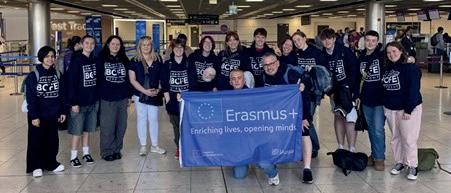
Students will have the opportunity to complete placements in their vocational area in countries such as Finland, Germany, Holland, Malta and Spain. Placements normally take place during the academic year November to May. If your application to work aboard is successful, you will qualify for a grant towards the cost of the mobility programme including travel, accommodation and living expenses. In addition, you will receive language and cultural preparation prior to departure.
All BCFE students wishing to take part on an Erasmus+ mobility will need to apply and undergo a selection process. All students will also need to have:
1. All course registration documentation submitted
2. Have an excellent attendance record with assignment work up to date at time of selection. This will be verified at selection
3. A valid passport (which is not less than 6 months away from expiry)
4. A valid in date European Health Insurance Card
Applications for an Erasmus+ mobility will take place over a phased basis throughout 2024/ 2025 with applications starting from November 2024. Application will require students to:
Submit a five slide presentation showcasing their CV, why they should be considered and how they see themselves benefiting if selected
Complete an electronic fund transfer application to facilitate payment of monetary subsistence if selected
Sign a contract which outlines their roles and responsibilities while on an Erasmus+ placement
Confidentiality submit a medical details and next of kin details form
Attend at least two mandatory preparation meetings where details of the mobility are outlined if selected
If selected, students flights and accommodation are paid for, and student receive a monetary subsistence paid into their bank account for the trip, though it is expected that students supplement any shortfall in their monetary subsistence with their own money if needed.

The College Campus is made up of three buildings, which are open weekdays 8am5.00pm. Courses are scheduled across the three buildings; however certain courses are located in specific buildings as follows:
Media Building
Social Care
▷ Television, Film and Visual Effects
There are two administration offices in BCFE – one located in the Main Building and one in the Arts Building; students in the Media Building should access the office in the Main Building. Both offices are open for student queries from 9.00 – 1.00pm and 2.00 – 3.30pm daily. All student forms (e.g. Social Welfare, Grant Forms etc.) and requests for letters must be delivered in person two days in advance to either the Main Office, or the Arts Building Office. Student ID cards must be presented when collecting forms and/or letters.
You will be issued with the instructions to create your own virtual ISIC student card when you are a fully registered student in BCFE. This International Student Identity Card (ISIC) is recognised as accepted proof of your student status both nationally and internationally. This ID card gives you access to a diverse selection of benefits and discounts around the world. Refer to www.isic.ie for the full list of benefits.
BCFE canteen facilities are provided by Coffeecup catering in both the Main and Arts buildings; opening hours are from 8.30 am to 2pm, Monday to Friday. Students based in the Media Building access the canteen facilities in the Main Building. Payment in the canteen is via contactless payment. There are vending machines (drinks and snacks) available in all three buildings.
The car park in the Arts Building is reserved for staff, visitors and students with disabilities. All other students can park in the car park in front of the Main and Media Buildings.
A limited number of lockers are available for students to use during the academic year in the Arts and the Main buildings. Lockers are allocated on a first-come-firstserved basis by the Porter in each building.
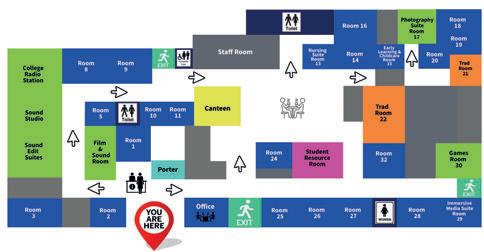
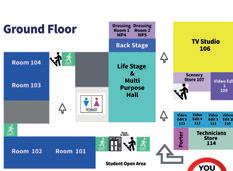
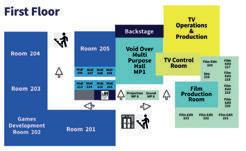
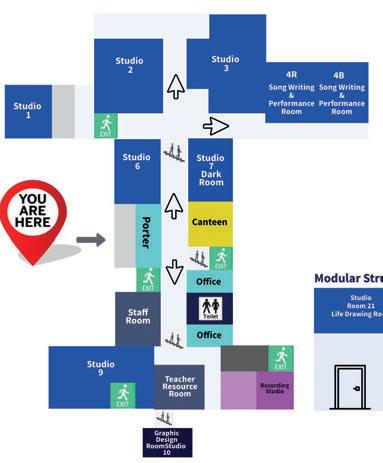

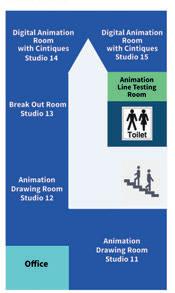
Enquiries about lost property should be directed to the porter’s desk at the main entrance of each building.
Two photocopiers for student use are located outside the staff room in the Main Building and outside the Student Resource Room in the Arts Building. Students based in the Media building can access the photocopier in the Main Building. Cards with a set allowance for photocopying (at a cost of €2) are available from the administration office in the Main Building and the porter’s office in the Arts Building.
A selection of art materials are available for purchase throughout the academic year in the Art Department’s Technician’s (Cathy Gissane) office in the Arts Building beside Studio 1. The process for purchasing these materials will be online and information about this process will be given to all art students at induction.
While in class, students are requested to have their phones on silent at all times and are asked not to record or post to social media without permission. No phone calls/ messages can be taken in the office for students.
BCFE is committed to providing a safe and healthy learning and working environment for all students staff and guests.
As a student of BCFE you should read and understand the following health and safety guidelines and familiarise yourself with the precautions and protocols that apply to you. All students of BCFE are required to work in a safe and responsible manner. Under the Health and Safety Act 2005, each student must pay due regard to their own safety and to the safety and welfare of others. Successful participation on your course in involves behaving in a professional, caring and responsible manner.
▶ While on the course you will receive full instructions in the correct and safe handling of equipment and materials.
▶ If you are ever in doubt as to the correct use of equipment or materials, stop using the equipment and then ask a member of staff for guidance.
▶ Familiarise yourself with all
exits in case of emergency. If you move within the three buildings familiarise yourself with all exits in each building.
▶ In the interest of everyone’s wellbeing and health, aerosols may not be used in any classroom or indoors, these include: fixatives, spray mount, car spray, hairspray and varnishes.
▶ BCFE’s fully equipped First Aid cabinets are located in all three porters’ offices and in the two administration offices.
▶ Note that all three buildings in BCFE are no-smoking and nonvaping zones. This means that there is no smoking or vaping on campus or outside the buildings. The designated smoking areas for staff and students on BCFE campus are the courtyards in both the Main and Media Buildings, and the seating area behind Studio 9 in the Arts Building.
▶ There are three isolation rooms, one in each building on campus
Ballyfermot College of Further Education, in co-operation with Ballyfermot Public Library, provides you with an enhanced learning experience. Through the library, you have access to:
▶ Professional research staff
▶ Study spaces and group study rooms
▶ Workshops, seminars, student performances, recitals and exhibitions
▶ Coffee dock
▶ Dedicated College Space: with over 2,000 course related titles
▶ e-Resources: e-books; e-magazines, digital comics, e-journals, national and international newspapers; art and visual culture; databases for business, management and marketing; free online music and art instruction, lessons for instruments, voice, art and music theory
▶ Creative Studio facilitates recordings of podcasts, music videos, interviews, group discussions, oral histories
▶ NEW: The Larry Gogan Collection
The BCFE Library Catalogue can be easily accessed through the Dublin City Library homepage at: www.dublincitylibraries.ie. Search the catalogue for availability and to reserve any library item.

You can also register online through the Dublin City Library homepage to become a member of the library.
City of Dublin FET College, Ballyfermot Campus (BCFE) stands out as a pioneering institution in promoting sustainability and environmental awareness. This commitment is vividly reflected through various initiatives and events aimed at fostering a green consciousness within the college community and beyond.
In March 2024, BCFE hosted its first Climate Justice and Sustainability Event, marking a significant step in its sustainability journey. The event featured Senator Lynn Boylan, an advocate for climate justice, and Eric Dempsey, a renowned wildlife expert. Their discussions covered pressing issues like biodiversity and the urgent need for climate action, providing attendees with valuable insights into the environmental challenges facing our world today.
Paul McGrattan (BCFE) spoke about his students’ role in leading research and development into producing sustainable parts for traditional musical instruments. Tony Walker, student of Irish Traditional Music Performance and Traineeship in Instrument Making, Repair and Maintenance spoke of his specific research into developing chanters for the uilleann pipes. This was followed by a live performance by BCFE students of traditional music.

The event was a holistic celebration of sustainability. The day concluded with an art exhibition titled “Our Human Nature,” which visually communicated the intricate relationship between humans and nature, emphasizing the need for harmony and respect for our environment.
BCFE’s approach to sustainability extends beyond single events. The college is embedding green principles into its curriculum and campus culture. By integrating environmental education into various courses, BCFE ensures that students from all disciplines understand and appreciate the importance of sustainability. This multidisciplinary approach equips students with the knowledge and skills needed to contribute to a more sustainable future, regardless of their chosen fields.
The college’s efforts are not limited to academic pursuits. BCFE actively promotes sustainable practices on campus with a managed biodiversity meadow for insect and other pollinators. In our biodiversity meadow, mowing is in line with All-Ireland Pollinator Plan guidelines, geared towards biodiversity. Other initiatives such as waste separation for recycling, energy conservation promotion with short courses for students certified by the SEAI and promoting the use of public transportation reflect the college’s commitment to reducing its environmental footprint. These initiatives not only make the campus more sustainable but also serve as practical examples for students, instilling in them the importance of everyday environmental responsibility.
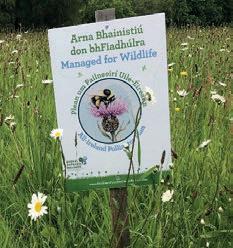
BCFE also recognises the importance of community involvement in achieving sustainability goals. By hosting environmental awareness events across curriculum areas, BCFE fosters a culture of environmental awareness and activism that extends beyond its campus, encouraging broader societal change. These efforts not only benefit the immediate college community but also contribute to the global movement for environmental sustainability and justice.
BCFE is serviced by the following buses which stop outside the College on Ballyfermot Road or near the College on Kylemore Road:
BUS ROUTES FROM
L55 From: Hollyville Lawn (Palmerston Village) - Ballyfermot Road - Glenaulin
C1 From: Lucan (Dodsboro), Parkgate Street, City Centre (Aston Quay), Merrion Square
26 From: Liffey Valley, Palmerstown, Temple Bar, City Centre (Wellington Quay), Pearse Train Station
C2 From: Maynooth, Leixlip, Lucan, Parkgate Street, City Centre (Wellington Quay)
C3 From: Maynooth, Celbridge, Lucan Village, Parkgate Street, City Centre (Wellington Quay), Pearse Station
C4 From: Maynooth, Celbridge, Lucan Village, Parkgate Street, City Centre (Wellington Quay), Pearse Station
G1 From: Red Cow Luas – Ballyfermot – City centre – Spencer Dock
G2 From: Liffey Valley SC – Ballyfermot – City centre – Spencer Dock
60 From: Red Cow Luas – Clondalkin – Cherry Orchard – Ballyfermot – Decies Rd. – Islandbridge – City centre – Sir John Rogerson’s Quay
S4 From: Liffey Valley SC – Ballyfermot – Kylemore (LUAS) – Long Mile Road – Crumlin - Terenure -
76A From: Tallaght (The Square), Clondalkin Village, Liffey Valley, Blanchardstown S.C.
860 From: Park West, Heuston Train Station, Temple Bar, City Centre (Aston Quay)
Bus Eireann will no longer accept college ID cards for discounted fares. To avail of half price fares on Bus Eireann and Expressway services you must hold a Student and Young Adult (19-23) Leap Card.
Luas Red Line: From Tallaght or City Centre to Kylemore Luas Stop on Naas Road, you can then take the 18 Bus to BCFE

From Heuston Train Station: you can take the following buses to BCFE G2, 60 and the 860
From Pearse Street Train Station: you can take the following buses to BCFE: 26, C3, C4
Proceed west on the South Quays on the R148. Continue on the R148 past Heuston Station, onto the Chapelizod Bypass/St John’s Rd West. Turn left onto Con Colbert Rd/ R833 and continue to the roundabout, take the 2nd exit onto Ballyfermot Rd R833. BCFE is the second turn on the left.
From M50 take exit 7, keeping left for the N4, and take lane for the R148 City Centre/ Palmerston. Merge onto Chapelizod Bypass/R148. Continue on the Chapelizod Bypass/ R148. Take the ramp to R112. Continue onto R112 and turn right onto Kylemore Rd/ Lucan Rd/R112. At the roundabout, take the 3rd exit onto Ballyfermot Rd/R833. BCFE is the second turn on the left.
Continue on the N7/R110 toward City Centre/Inchicore. Keep right to continue on Naas Rd/R110/R810. Turn left onto Kylemore Rd/R112. At the roundabout, take the 1st exit onto Ballyfermot Rd/R833. BCFE is the second turn on the left.
▶ The NFQ is a nationally and internationally recognised framework that is designed so that different levels of qualifications can be commonly recognised.
▶ Certification offered on all of BCFE’s courses are fully recognised between level 4 and level 8 on the NFQ.
▶ A key purpose of the NFQ is to enable access and progression opportunities within education and training.
Ballyfermot College provides a wide variety of programmes that lead to awards validated by seven different awarding bodies, QQI, Pearson, ACCA, IPASS, Dublin City University, University of Dundee and IADT
▶ QQI (Quality and Qualifications Ireland) is a state agency with responsibility for quality assurance of education and training and for qualifications in Ireland. See www.qqi.ie
▶ BTEC (Business and Technology Education Council) awards are owned and regulated by the UK awarding body Pearson.
▶ The Association of Chartered Certified Accountants (ACCA) is the global professional accounting body offering the Chartered Certified Accountant qualification. BCFE’s Certified Accountancy Pathway and Payroll Traineeship (BAT) is awarded the industry standard Diploma in Accounting and Business by ACCA.
▶ The Irish Payroll Association (IPASS) is Ireland’s leading provider of Payroll and VAT training and certification. BCFE’s Certified Accountancy Pathway and Payroll Traineeship (BAT) is awarded the industry standard QQI Level 6 Special Purpose Award in Payroll Techniques by IPASS.

Ballyfermot College offers three degree courses which are listed below. For each of these courses there are supplementary handbooks which set out academic information and regulations relevant to these courses only.
▶ Media Production Management BA (Hons) Degree Level 8, validated by Dublin City University) (DCU) is a oneyear top up degree in BCFE. Students must have successfully completed an appropriate HND to apply. This one-year top up agreement will cease after the final enrolment of students in September 2025.
▶ Animation (Visual Media) BA (Hons) Degree Level 8 (validated by University of Dundee, Scotland (UoD). This is a two-year top or degree, and students must have completed an Animation HND, or equivalent qualification, to apply.
▶ Games (Visual Media) BA (Hons) Degree Level 8 (validated by University of Dundee, Scotland (UoD). This is a two-year top up degree and students must have completed a Games HND, or equivalent qualification, to apply
▶ Ballyfermot College of Further Education (BCFE) is now in partnership with the Institute of Art, Design + Technology Dún Laoghaire (IADT) to offer Year 1 and Year 2 of a fouryear degree programme (the BA (Hons) Immersive Media Production) on the Ballyfermot campus. On successful completion of Year 2 students will be awarded a Higher Level 6 Advanced Certificate. Year 3 and Year 4 (of this degree) will be delivered on the IADT campus, Kill Avenue, Dun Laoghaire, Co. Dublin.
BCFE is fully aware that students can encounter difficulties at course commencement or during a course which can lead to students not starting or not completing the course in the given academic year. To facilitate such situations that may arise for students the following options are available.
A student can defer their course for one academic year prior to course commencement. To defer the student must email their request to info@bcfe.cdetb.ie. This means that the student can secure a place on their course for the next academic year.
If a student commences a course and realises that they are not able to complete the course, they can request “Delayed Course Completion”. This request must be made on or before 30th of November of the given academic year. Only those students who are fully registered can avail of Delayed Course Completion. All requests must be emailed to info@bcfe.cdetb.ie. This means that the student can secure a place on their course for the next academic year but is required to recommence all classes and submit all assignments again.
In certain cases, a student who has not completed the course may apply to repeat the year after the 30th of November of the given academic year provided they are fully registered students. There is no automatic right to repeat. Each case is examined on its own merits and requests for repeat must be made to info@bcfe.cdetb.ie
Note: A fully registered student is one who has paid all fees and supplied all the requested documentation.
At induction, your course coordinator along with your module teachers will explain the organisation of your course. Your course coordinator will be your first point of contact throughout the academic year and will monitor the progress of the group and of individual students.
Each course will have a tailor-made timetable to ensure all curricular areas that are required to achieve the full award in each academic year are accounted for. Start and end time to the academic day and individual class duration varies across the college, depending on the course of study. During the year you will have periods when you are not timetabled for formal classes. These periods allow you time for research, reading and completion of assignments. Organising your time is an important skill which enables you to get the most out of your course.
Delivery of all courses during the academic year 2024-2025 will be face-to-face.
You are embarking on a course of study related to your chosen career. This course combines theory and practice, where you may work in groups on some assignments and individually on others. You are expected to be actively involved in your own learning through a variety of activities and will be encouraged to research information for yourself, to develop your skills in communication and teamwork. Assessments will be set which will help you to develop skills and knowledge as an integrated part of your course. Your course coordinator and specific module teachers will outline the modules relevant to your particular course during your induction period and supply you with an assessment plan for the year.
Quality and Qualifications Ireland (QQI) awards are normally achieved in one year and are composed of a minimum of eight modules, that include specific and mandatory modules related to your chosen vocational area. QQI courses are moderated by QQI External Authenticators to ensure national standards are met.
All BTEC awards are recognised on the NFQ and all BTEC courses are moderated by an external examiner who will typically visit the college twice in an academic year and will meet with students on the course to ensure national standards are met.
▶ On successful completion of Year 1 of a two-year Higher National Diploma (HND) an Higher National Certificate (HNC) will be claimed for each 1st Year HND student. It will be included as part of the overall HND award on successful completion of Year 2.
▶ BCFE offers Higher National Diplomas which are two year courses of study.
▶ The Higher National Diploma is recognised by the National Academic Recognition Information Centre (NARIC) as being comparable to the Higher Certificate at NFQ Level 6, (see www.naric.ie). They normally have 16 modules studied over two years.
▶ The joint HNC and HND award has a transferable value of 120 ECTS credits and it is comparable to Level 6 on the National Framework of Qualifications (NFQ).
▶ The HNC is a standalone award with a transferable value of 60 ECTS (European Credit Transfer and Accumulation System).
▶ The top-up HND has a transferable value of 60 ECTS credits.
Degrees offered in BCFE are validated and structured by individual awarding bodies as outlined on page 13. All modules are mandatory. Students completing a degree in BCFE are required to provide evidence that they have reached a comparable Level 8 Honours Degree standard to Higher Education Institutions either within Ireland or abroad.
To achieve this standard, students are required to spend considerable time self-directing their own learning. This includes developing the following academic skills to a high standard: research skills, critical thinking, self-reflection, academic writing including academic referencing. Integral to the degree programmes are group work, presentation and public speaking skills.
In particular the Animation and Games Degrees are delivered in a studio environment where students are expected to engage with the curriculum through group work and developing their own independent software skills.
External examiners to monitor the standard of the degree programmes are appointed annually by both the University of Dundee and Dublin City University.
▶ BA (Hons) Animation – Visual Media Degree is certified by University of Dundee (UoD)
▶ BA (Hons) Games – Visual Media Degree is certified by University of Dundee (UoD)
▶ BA (Hons) Media Production Management is certified by Dubin City University (DCU)
The Institute of Art, Design + Technology Dún Laoghaire (IADT) has partnered with City of Dublin Education and Training Board (City of Dublin ETB) and Kildare Wicklow Education and Training Board (Kildare Wicklow ETB) for the codesign, co-development and co-delivery of the BA (Hons) Immersive Media Production degree.
The new degree has been developed as part of the new tertiary programmes initiative. It is an HEA/SOLAS initiative that aims to create new pathways to tertiary education with students beginning their studies in a College of Further Education before progressing directly to a Higher Education Institution.
Students will complete Years 1 and 2 in Ballyfermot College of Further Education (BCFE) before progressing to IADT in Years 3 and 4. On successful completion of Year 2 students will be awarded a Higher Level 6 Advanced Certificate. The delivery of Year 1 will commence in BCFE in September 2024.
Please refer to your respective degree handbooks for further details.
▶ BA (Hons) Immersive Media Production is certified by Dún Laoghaire Institute of Art, Design and Technology (IADT)
As a registered full-time student you must participate fully on your course. This includes full attendance and participation in all classes. Continuous assessment is an intrinsic feature of all the college’s courses, and this requires full participation, as learning is built on sequential blocks. Courses are demanding and success is dependent upon attendance (in class or online), commitment and hard work. What you truly get out of a course is what you put into it!
Work Experience is a mandatory element of many courses. The arrangements for work experience will vary according to each course, but in general work experience will cover a block of 2 to 3 weeks. Students are encouraged to find their own work experience, but assistance will be given by college staff if necessary. The work experience must be with an employer appropriate to the course.
Part-time work is often a necessary source of funding for a student. Striking a balance between the demands of coursework and part time work is also necessary. Working long hours in part-time jobs can greatly interfere with the quality of your course work. The recommendation is no more than 11 hours a week in a part-time job, as any more is considered to be excessive.
Every course/activity requires a commitment to attend fully, and on time, all parts of the course. Any student unable to fulfil this commitment may be required to leave the course/activity.
Students who have been absent without satisfactory explanation for fifteen days will be deemed to have opted out of the course. In general, a minimum of 75% attendance is required. Re-enrolment can only occur with the permission of the Principal, Cecilia Munro.
The policy of the college is to address unsatisfactory attendance in consultation with the student.
Poor attendance will affect SUSI grant payments as BCFE is obliged to confirm attendance with SUSI on a monthly basis.
September 2024
All students will receive a course assessment plan on course commencement
September 2024 to April 2025 Students complete and submit assignments according to the assessment plan throughout the academic year Feedback will be given to students on all assignments in a timely manner
Pre-Christmas Examinations take place between Monday, 16th of December and Friday, 20th of December
Last date for the final submission of assignments is the 30th April 2025. Assessment evidence submitted after the final submission deadline will be assessed for the Autumn exam boards in September 2025
End of Year Examinations take place between Monday, 1st of May and Friday, 9th of May
In May 2025, all student evidence is prepared for final award determination according to the following process:
• Students upload work in the correct online format for correcting and grading
• All student evidence is internally verified
• All student evidence is verifed externally
• Final Grades Meetings are completed
• Results are uploaded to the different awarding body platforms
• Provisional results are made available to students at the end of May 2025
• Internal progression is offered to those who meet the criteria
• QQI Students who wish to appeal their provisional results in June 2025 will be given 10 days from receipt of their QQI provisional results to lodge an appeal with the college with the payment of an appeals fee.
• BTEC students may appeal their results at no cost, within 10 days of receiving their results, by emailinginfo@bcfe.cdetb.ie
• DCU, UoD and IADT students, details on appeals procedures for degrees are available in the respective Handbook or from the degree co-ordinator.
Students who are unsuccessful in attaining their full award may under exam board criteria be offered either a Summer Repeat for QQI or a Summer or Easter Projects for BTEC in order to complete their outstanding modules/units. Summer and Easter projects will have a defined deadline for submission.
Your coordinator and individual module teacher will explain the nature and type of assessment that will apply to your course and to each module at induction. These assessments may include portfolios, projects, written reports, skills demonstrations, oral presentations, class-based tests, or examinations.
You should ensure that you are fully aware of the assessment techniques, assessment schedule and percentage allocated to each piece of work. Most of these assessments are locally devised and graded with internal cross-moderation and external verification.
Some QQI, BTEC and degree courses use examinations as part of their assessment provision. It is the responsibility of students to be present on the BCFE campus during term time throughout the academic year to take part in all required assessments and examinations for their course. You will be responsible for ensuring that you are aware of the dates, times, and location of examinations relevant to your course of study.
Retain a full copy of your assessment work in case an additional copy is needed.
(See Student guidelines for examinations in the Student Handbook).
▶ All assignments will have a date for completion and submission.
▶ Allowances for extended submission dates will only be made in exceptional circumstances, such as illness or bereavement.
▶ When a student is aware in advance of a reason for non-submission by the deadline an extension can applied for in writing. In exceptional circumstances a revised deadline can be agreed in writing.
▶ Where a student has missed a deadline with no advance notice, the grade is deemed a fail (pending action by the student).
▶ Where group work is undertaken as part of assessment, work is assessed both on a group and on an individual basis.
It is possible students may experience unforeseen difficult circumstances, like illness or misfortune, that adversely affect their ability to complete an assessment, or impacts the results they obtain for an assessment during their course of studies at City of Dublin FET College Ballyfermot Campus (BCFE). The college defines mitigating circumstances as ‘unforeseeable or unpreventable circumstances that could have, or did have, a significant adverse effect on the academic performance of a student’.
1. Significant illness or injury; or worsening of an ongoing illness or disability, including mental health conditions.
2. The death or critical/significant illness of a close family member/dependent.
3. Significant family or personal crisis or major financial problems leading to acute stress.
Evidence to substantiate mitigation, such as medical certificates, appointments with the colleges’ guidance counsellors or evidence from an outside professional may be requested by the college.
1. A request must be submitted in writing (by email) with the subject title being ‘Request for Mitigation’ to mitigation@bcfe.cdetb.ie at least two weeks prior to final submission of assessments.
2. Students should also address their mitigation request to the relevant course guidance counsellor and course coordinator.
The mitigation will be reviewed at the exam boards to determine the fairest outcome for the student involved. Students will be informed of the exam board’s decision after all assessment results are approved.
Recognition of Prior Learning (RPL) occurs when an education institution acknowledges the knowledge, understanding, and skills you already possess prior to commencing a program or module. This process prevents the duplication of learning, ensuring that you do not need to relearn material with which you are already familiar. The process of application for RPL varies depending on the circumstance and awarding body within the college.
1. QQI: Student undertaking a QQI Level 5 or Level 6 course can apply using modules that they previously completed for an exemption to an existing module on their course. Details of the application for RPL will be emailed to all students by the QQI coordinator in late September 2024.
2. BTEC: A student requesting RPL presents evidence of having achieved the specific learning outcomes being claimed to their course coordinator. The course coordinator asks the teacher to decide to either accept or reject the claimed learning outcomes based on a judgment of the evidence presented. In the event of some outcomes remaining outstanding, the student will need to complete areas of the assignment that meet these outcomes to the satisfaction of the teacher. The deputy principal with responsibility for the programme and another teacher reviews the presented evidence and the decision before the student is informed of the outcome. The student may appeal the decision.
Students undertaking courses in BCFE validated by Dublin City University, the University of Dundee or the Institute of Art, Design and Technology should contact their coordinator regarding RPL which will be undertaken using the validated institutions own policies and procedures.
▶ The student should be present at the appointed location at least fifteen minutes ahead of the commencement of the examination.
▶ Once the examination has commenced, all late arrivals will be directed to a holding room and will be allowed commence 20 minutes after the commencement of the exam.
▶ Students, who arrive 1 hour after the commencement of the examination, will not be permitted to sit the examination.
▶ All bags, switched off mobile phones and study material must be left at a designated place in the room and examination materials (e.g. pens, pencils, rubber, Tippex, calculator) only can be retained at the desk. Water or soft drinks are permitted.
▶ If there are any questions or queries during the examination, the student must raise their hand and wait for the exam supervisor to attend to the query.
▶ If more than one script is used, the student’s name, class, teacher ’s name and examination must be clearly marked on all scripts which should also be clearly numbered.
▶ An Attendance Sheet will be circulated for signing during the examination; it is noted on this attendance sheet the time the student leaves the exam hall and how many scripts were handed up.
▶ A student may not leave the examination hall within the first hour of the start of the examination. Thereafter, they may leave at 20 minute intervals.
▶ If a student requires a bathroom break, they must raise their hand and wait until the exam supervisor can escort them from the exam hall; a limited number of students are allowed out a time.
Students may have their examination cancelled if during examinations, if they:
▶ Have in their possession any books, notes or papers other than stationery/ equipment allowed.
▶ Attempt to aid another student.
▶ Communicate or attempt to communicate in any way with another student.
▶ Disrupt other students.
A student’s performance in each module is graded as Distinction, Merit, Pass, or Unsuccessful.
Distinction D 80% - 100%
Merit M 65% - 79%
Pass P 50% - 64%
Unsuccessful U Below 50%
▶ Grades are not final or official until they have been approved by the QQI Results Approval Panel (RAP) following external authentication in May.
▶ Final results are usually available in the college by mid-July. QQI have an appeals procedure in place. (See details of the appeals procedures below).
▶ Certificates will be presented to students at graduation.
BTEC assessment and grading is outcome based. Each BTEC unit has a set of outcomes that must be covered in the delivery and learning, and all the outcomes must be achieved to gain a Pass in the unit.
Assessment and criteria for grading is created to enable the student to achieve the higher-grade descriptors/grading points of Merit and Distinction.
Pass: Students who achieve all the Learning Outcomes of a unit will achieve a Pass grade for the unit.
Merit: Students who build on a Pass (achieving all the outcomes) to achieve the Merit criteria for the unit will achieve a Merit grade for the unit.
Distinction: Students who achieve a Pass (achieving all the outcomes) plus the Merit criteria, plus the Distinction criteria for the unit will achieve a Distinction grade for the unit.
Additional college grading for BTEC work
Referral: The performance in the assignment does not reach Pass standard in all areas, but can be improved or reworked in certain aspects to achieve a Pass. The student must resubmit within an agreed time.
Fail: The student has not submitted work within the time allowed or the performance is so far below pass standard that a complete reassessment of the relevant outcomes is necessary.
Grading criteria for degrees awarded by DCU, UoD and IADT are available in the degree handbook which students will receive at course commencement. Students need to be mindful of these criteria when preparing their work for assessment as it is a combination of results from all modules that leads to the final degree award classification that students will graduate with, such as pass, second-class honours or first-class honours.
Each of the seven awarding bodies in BCFE have different policies and procedures for appealing a grade awarded to a piece of work or an overall grade. Module teachers will engage with students about the assessment work students must complete to achieve their award. This engagement will address the standard and form of work required for assessment. The module teacher corrects the work, provisionally grades the work and will give feedback. Should a student feel that they should have been awarded
a higher grade, any student can invoke the internal appeals process under the following headings:
1. Mitigating circumstances
2 Procedural errors including administrative issues
3. Perception of bias or prejudice on behalf of the teachers
The first step for a student is to talk to the teacher concerned immediately. The teacher will normally review the work and discuss the grade with the student in the light of criteria specified.
• Students dissatisfied with a grade in a unit/module must inform their coordinator by email within 48 hours of receipt of the grade.
• The student will discuss their grade with the module teacher pending an appeal.
• If the matter is not resolved, and the issue involves the quality of the work the coordinator will appoint a person from the teaching staff to review the work and award a grade without prior knowledge of the student making the appeal and the appellant will be informed of the new grade within 48 hours.
• If the issue relates to the rules and procedures rather than quality of the work, the coordinator will decide on the matter.
• If the student is still not satisfied, then the appeal can be taken to the college BTEC/QQI Coordinator.
• The role of the coordinator is to establish if the correct procedures have been followed.
• Where the correct procedures have been followed, the grade stands.
• The BTEC/QQI coordinator will respond within one week of the matter being referred to him/her.
• The student can make a final appeal to the college appeals panel which consists of the Principal, Deputy Principals, and co-opted academic expert(s).
• The panel will respond within two weeks of the matter being referred to the panel.
• The decision of the college’s appeals panel will be final on the matter
In addition, for those students receiving a QQI award, there is an additional opportunity to appeal a grade. BCFE will inform students in late May or early June of their official QQI grades and, at the same time, outline the formal QQI appeals.
1. A student who achieves an Unsuccessful grade in one or two QQI modules may submit the relevant assignments also known as summer repeats by Friday 22nd August 2025 through an online form. Grades for the resubmitted work will be internally verified, assessed, and overall student outcomes signed off at the September 2025 exam board meetings.
Note 1: The grading of all summer repeat work for QQI modules is not capped. A student who does not have the required mandatory and elective modules for a full award after the September 2025 exam board will receive a QQI component certificate.
2. A student who achieves an Unsuccessful grade in three or more QQI modules and has documented and supported mitigating circumstances will be given serious consideration at the May 2025 exam board meeting and may be given the opportunity to repeat the year.
Students should note that repeating the academic year will mean that the course fees will be payable again, and they will not be eligible for a SUSI grant when repeating the same level of course.
Note 2: A common progression route is the Higher Links Scheme, whereby students can use Level 5 or Level 6 QQI results for admission to a third level course which is linked to your award. Students should note that most third level institutions require full completion of a Level 5 Award within one year and in one sitting in order to access the Higher Links Scheme.
Students who have successfully completed their full Level 5 or Level 6 QQI award in May 2025 can avail of round zero offers through the CAO in early August 2025.
Students who have not achieved their full BCFE QQI award due to being unsuccessful in certain QQI modules will not be able to avail of CAO round zero offers.
Students are advised to make an appointment with the Guidance Counsellor early in the year, to ensure they have up-to-date information on progression links.
1. A student who achieves a Referral/Fail grade in one or two units:
The student may submit the relevant assignments also known as summer projects by Friday 22nd August 2025 through an online form. Grades for the resubmitted work will be verified and overall student outcomes signed off at the September 2025 exam board meetings.
2. A student who achieves a Referral/Fail grade in three units:
The student may submit the relevant assignments by Friday 17th April 2026 (known as Easter repeat work) through an online form. Grades for the resubmitted work will be verified and overall student outcomes signed off at the May 2026 exam board meetings.
Note 1: The grading of all BTEC summer and Easter project work is capped at a Pass.
3. A student who achieves a Referral/Fail grade in four or more modules: The student will be eligible to receive a ‘BTEC Fallback Certificate of Unit Achievement’ listing all grades achieved. The Certificate must be requested in writing (to the course coordinator) by the student. Claiming this Certificate closes a student’s BTEC registration.
4. BTEC Examinations will not be considered as assignments for the above guidelines and students will be permitted to repeat examinations a maximum of three times before a fail grade is awarded. The grade for all repeat examinations is capped at a Pass. Note 2: Serious (documented and supported) mitigation will be taken into account at the May and September Exam Board meetings before a final outcome (for the student in question) is confirmed.
Within BCFE students can progress from level 4 to a level 8 Honours Degree. Clear progression pathways are illustrated in the graph below.
MATURE APPLICANTS (21+)
BCFE NFQ LEVEL 4 AWARDS
e.g. Certificate in General Learning (RTL)
LEAVING CERTIFICATE APPLIED / QQI LEVEL 4
LEAVING CERTIFICATE LCVP
BCFE NFQ LEVEL 5 AWARDS
e.g. Animation Drawing Studies (CDS)
BCFE NFQ LEVEL 6 AWARDS
e.g. Classical and Computer Animation
UNIVERSITIES NFQ LEVELS 7 & 8 AWARDS
BCFE NFQ LEVEL 7 & 8 AWARDS
e.g. Animation (Visual Media) BA (Hons) Degree (CDA)
INSTITUTES OF TECHNOLOGY AND TECHNOLOGICAL UNIVERSITIES NFQ LEVELS 6, 7 & 8 AWARDS
BCFE graduates gain qualifications from QQI, Pearson, ACCA, IPASS, Dublin City University, University of Dundee and IADT.
BCFE courses offer progression options either within BCFE or an alternative pathway to degree, through the Higher Education Links Scheme.
The Higher Education Links Scheme (HELS) reserves a number of places on specified courses for those who hold a full QQI certificate in a related area. For more details visit www.cao.ie or check with the relevant 3rd Level Institution.
Applicants are advised at all times to confirm linked awards, additional component requirements, application process and scoring system with the admissions offices of the relevant Higher Education Institutions.
Students can always refer to the Guidance Counsellor for advice and guidance.
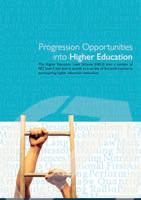
IMPORTANT INFORMATION FOR STUDENTS WHO HAVE ALREADY COMPLETED SOME QQI
The following Universities and IOTs require a QQI Level 5 Major Award in one sitting, i.e. you have one academic year to complete all 8 modules in order to meet the minimum entry requirements for courses in these colleges. For more details please visit www.cao.ie or check with the relevant 3rd Level Institution.
Students can always refer to the Guidance Counsellor for advice and guidance.
The higher education institutes that score by single sitting are:
▶ Atlantic Technological University (ATU)
▶ Dublin Business School (DBS) and DBS School of Arts
▶ Dublin City University (DCU)
▶ Dun Laoghaire Institute of Art Design and Technology (IADT)
▶ Mary Immaculate College of Education
▶ Maynooth University (MU)
▶ National Counselling Institute of Ireland
▶ National University of Ireland Galway (NUIG)
▶ Shannon College of Hotel Management
▶ Technological University Dublin (TU)
▶ Technological University of the Shannon: Midlands (TUS)
▶ Trinity College, Dublin (TCD)
▶ University College Cork (UCC)
▶ University College Dublin (UCD)
▶ University of Limerick (UL)
▶ South East Technological University (SETU)
Disability Access Route to Education (DARE) is a third level alternative admissions scheme for school-leavers whose disabilities have had a negative impact on their second level education/Leaving Certificate results. DARE offers reduced points places to school leavers who as a result of having a disability have experienced additional educational challenges in second level education. (DARE does not apply reduced points to PLC or Further Education Qualifications).
DARE requires applicants to have an Educational Statement that covers at least the three most recent years that they spent in secondary education. DARE applies to CAO applicants under the age of 23 as of 1 January 2025. Applicants to DARE can present with an Irish Leaving Certificate, A-Levels and other EU qualifications. To be eligible for DARE you must meet both the DARE evidence of disability criteria and DARE educational impact criteria.
18 Colleges/Higher Education Institutes (HEIs) participate in DARE. Each participating college and university has a reserved number of places to offer eligible DARE applicants at lower or reduced Leaving Certificate points. The applicant must also, like all other applicants applying to college, meet the minimum entry requirements and any specific course requirements before being considered for a DARE reduced points offer.
If you applied to AND were eligible for DARE in 2024, eligibility for DARE carries forward for ONE year provided that you:
▶ Apply to the CAO by 17.15 on 1st February 2025.
▶ And no later than 17:15 on 1st March 2025, disclose your disability and/or specific learning difficulty in your CAO application and fully and correctly complete Section A of the Supplementary Information Form (SIF). You must answer YES to Question 1 (‘Do you wish to be considered for DARE?’) on Section A of the fully completed SIF by 17:15 on 1st March 2025.
▶ Supply your correct 2024 CAO number under Question 1(b) by 17:15 on 1st March 2025. You will find more detailed info at accesscollege.ie There is also a useful application video on this website.
The Higher Education Access Route (HEAR) is a college and university scheme which offers places on reduced Leaving Certificate points with extra college support to school leavers from socio-economically disadvantaged backgrounds who are resident in the Republic of Ireland.
▶ HEAR is an admissions scheme to help students who may not traditionally go onto third level.
▶ HEAR does not apply reduced points to PLC/Further Education qualifications. Applicants will be eligible if they are applying to the CAO using their Leaving Certificate points rather than their QQI points.
▶ HEAR applicants must meet a range of financial, social and cultural indicators to be considered for a reduced points place and extra college support.
The applicant must also meet the minimum entry requirements and any specific programme requirements before being considered for a HEAR reduced points offer. The reduction in points for HEAR places varies every year.
When completing a HEAR application, applicants will receive online prompts requesting that they submit specific documentation to support above indicators. Applicants will receive a supporting document checklist at the bottom of the application form. The supporting document checklist will list what documents they need to submit to the CAO to complete their HEAR application. The checklist is based on the answers given in Section 7 of the online HEAR application form.
If you applied to AND were eligible for HEAR in 2024, eligibility for HEAR carries forward for ONE year provided that you:
▶ Apply to CAO by 17:15 on 1st February 2025 at the latest and indicate that you wish to apply to the HEAR scheme by 17:15 on 1st March 2025.
▶ Supply your correct 2024 CAO number.
▶ In the event of being offered and accepting a HEAR place carried over from the previous year, you will be required to provide the original documentation, copies of which accompanied your previous HEAR application.
You will find more detailed info at www.accesscollege.ie There is also useful application video on this website.
As a BCFE student IT will play a large role in your studies. You will have access to a wide range of equipment, software, online storage facilities and a BCFE digital devices depending on your chosen course of study and your financial situation. You are asked to treat these resources with respect and adhere to BCFE’s communications and computer usage polices which are available in your Student Handbook and on the college website.

As a student in BCFE you should access MyCampus.ie, the colleges’ support site for students, where you can find all you need to know about BCFE from a guide for new students to information on the range of student support services we offer and how to access them. MyCampus.ie also contains all college policies and procedures which you need to follow during your studies at BCFE, as well as details of upcoming events at the college, and how to orient yourself around the campus.
As a student of BCFE you will be issued with a student network account which will include a username and password. This will be issued to you by text at induction. For example:

username: will be Year of College Admission and your Name @bcfe.ie
e.g. 24JohnSmith@BCFE.ie
password: will be text, numbers and symbols
This account also affords you a printing allowance in BCFE.
Through your BCFE student network and email account you have access to all of the applications contained in Office 365. These include Outlook, Word, Excel, PowerPoint, Calendar, Forms and as well as the virtual learning environments (VLEs) used in BCFE including Microsoft Teams and Moodle.
A short video on how to log into your account is available on MyCampus.ie
All of these apps have options to work with them within your internet browser. However, it is recommended that you install them to your computer to get the full functionality of the applications. As students of BCFE, you can install Office 365 on up to five devices.
It is recommended that you work on your assignments on either a laptop or desktop computer and not on a mobile phone. If you do not have your own computer, you can apply for the loan of a laptop while you are studying at BCFE. Please contact the main office in BCFE to discuss your eligibility for a laptop loan. You can also use the student computer rooms on campus and there are computers and study spaces available in Ballyfermot Library which is next door to BCFE’s Main and Media buildings.
Microsoft Outlook will be used to receive and send emails.
Your college email will be one of the most important means of communication outside of your classes. You are expected to use email in a professional manner and refrain from any comments which could be regarded as disrespectful or offensive.

Once you are fully registered on the course, BCFE, including your teaching team, will ONLY use your college email, so it is important that you check your messages at least once a day.
Go to www.bcfe.ie
Click on MyCampus.ie to access your email account.
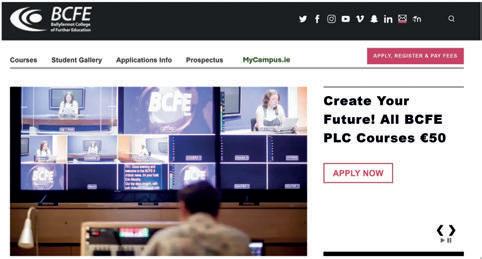
And follow the instructions to Sign in, using your username and password:
After accessing your email you can Click the App Launcher icon (located in the upper left corner) to choose the tool you want to use (Outlook, OneDrive, Word, Teams, etc.)
Details of how to get started with your BCFE email account is available on MyCampus.ie.
More detailed instructions are also available from Microsoft - Getting Started in Outlook Web App
Emails can be easily misunderstood and, therefore, it is important to ensure that the message conveys the intended tone (i.e. professional, friendly, courteous). Think of your correspondence over email as practice for your work in a face-to-face environment after college.
▶ Always use your@bcfe.ie account for college business.
▶ Insert a relevant subject line, including your course code and/or the module name, (e.g. ‘John Smith ITH1 - request for meeting’).

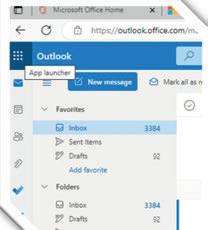
▶ In the body of the email, state who you are (e.g. John Smith ITH1 Individual Project; explain the purpose of your email, make a polite request, thank the receiver and sign off properly (e.g. Kind regards, Best wishes).
▶ Adopt a friendly and personable tone. Do not write anything that you would not be happy for everyone to see or that you would not say to the recipient’s face.
▶ Proof-read your email before you send it.
▶ Do not use text abbreviations such as ‘b4’, ‘gr8’ etc. in an email and avoid slang.
▶ Do not expect an instant or very quick response to your email, especially if it is not that urgent. Teachers will respond to you when they get the chance so be patient. Remember we all have the right to disconnect outside of working hours
NOTE: ALL COLLEGE CORRESPONDENCE
Your BCFE email account is only accessible in Ireland. However, if you travel abroad, while you are a student at BCFE, you need to request access to your account before you travel by emailing info@bcfe.cdetb.ie
Please be aware that your BCFE email account will no longer be accessible once you complete your studies at BCFE.
OneDrive is where you can save all your work, including class notes, and your assignments to the Microsoft cloud service. You can access them through OneDrive on any device. This eliminates the need to use a USB for storage and movement of your files.
Step to save to OneDrive:
▶ When working in Word or any application, and you have a file ready for saving, select the File tab, and then Save As. Then select the OneDrive option.
▶ If you have not already done so, you will be asked to enter your Office 365 email address and password.
Step to retrieve files from OneDrive:
▶ If you are using Microsoft Word, Power Point or Excel you click on Open, select the OneDrive option and select the required file.

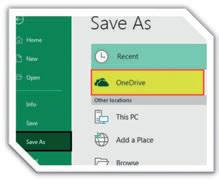
Depending on which course you are taking you will be using one of two virtual learning environments (VLEs). They are Microsoft Teams and/or Moodle. The login details for both are the same as your BCFE account and both systems can be accessed through mobile friendly apps as well as through your computer.
You will be informed at the start of the college year which of the following VLEs your course is using.

Teams will be used by teachers to communicate with students and share resources, these may include class notes and links to further information. It is also a space for students to present work and collaborate with both teachers and other students. You will be invited to become a member of Teams by your teachers.
Through Teams you have access to a calendar which you can use to organise your college workload. Teams has a handy mobile phone app that we recommend you download to keep up to date with your workload.
Moodle is the second type of virtual learning environment in use in BCFE, and like Teams this is where your teaching team will share resources with you.
When submitting assignments through Teams or Moodle, it is important to ensure you upload to the correct place. Your module teacher will talk you through this. It is also important to note that all work will be assessed for plagiarism through Turnitin.


Turnitin is a system that is used with VLEs that can help with the management of online submission of assignments and coursework. It allows students and staff to check submitted pieces of writing for unclear referencing, citation issues or potential instances of plagiarism.
Adobe Creative Cloud is available to registered BCFE students at no cost for use in coursework and assessments. Adobe Creative Cloud includes the latest Windows and Mac versions of Photoshop, Illustrator, InDesign, Aftereffects and Premiere software for illustrations, graphics, film and photography projects. The full suite offers a host of creative tools for digital imaging, design, web, and video, as well as online services and storage.
Online account activation is required and is available to students with a BCFE email account. The course coordinator informs students when they begin in September to activate their Adobe Creative Cloud account through a link sent to students via email. If a student hasn’t received a link they should contact licences@bcfe.cdetb.ie.
Social Media and technology are considered to be powerful communication tools that have a significant impact on organisational and professional reputations, but they sometimes blur the lines between personal voice and institutional voice.
BCFE is fully aware that social media, such as Facebook, X, YouTube, LinkedIn and Flickr, are now part of daily communications and BCFE does not seek to limit their use, but to ensure that they are used effectively and in a way that does not interfere with teaching and learning and the personal lives of BCFE staff and students.
▶ Any mention of BCFE, whether in professional or personal use of social media and whether inside or outside the workplace or college must be done in a responsible manner.
▶ As a student of BCFE, you are expected to treat your fellow students and staff with courtesy and respect and refrain from posting material that infringes on the rights of others. This equally applies to the virtual environment as it does to the physical environments of the campus or work placements.
▶ Class groups usually set up their own WhatsApp groups. These groups are set up privately and BCFE has no regulatory power over these groups. Students are responsible for what they post, and any complaint will be handled through the Code of Conduct or through the Student-to-Student complaint procedure.
▶ You are personally responsible for what and how you communicate online. In this context online communication includes email, VLEs (Virtual Learning Environments), instant messaging, chat rooms, and electronic noticeboards as well as all social media networks.
▶ Social networking and social media are powerful tools of communication which can significantly impact the reputations of organisations and individuals. Everything you post online is public and traceable and anything uploaded or posted will remain there in some form or another into the future.
▶ You should therefore strive for accuracy and post on social media sites information that adheres to the legislation in force at the time, for example the Defamation Act 2009 or the Prohibition of Incitement to Hatred Act 1989.
▶ You should not post on social media sites material that could be deemed threatening, bullying, harassing, illegal, offensive, indecent or obscene, defamatory, slanderous, or hostile towards any individual or entity.
▶ You are the publisher of information online and must take full ethical and legal responsibility for what you publish.
If you are having any difficulty in accessing any of these platforms and resources, you must inform either your course coordinator or module teacher. If you are having any technology related problems, you can request technical assistance from comptech@bcfe.cdetb.ie
BCFE has a limited number of laptops available for fully registered students to loan for the duration of the academic year. To apply please email info@bcfe.cdetb.ie with Student Laptop Loan Scheme in the subject line.

Welcome to the BCFE Guidance Counselling Department. There are 3 guidance counsellors in BCFE who work with designated departments. We are available to support you as you make your way through college.
We offer a listening ear, provide support, and offer guidance to facilitate you as you make informed decisions, cope with challenges and prepare for further study, work and life.
If you think we can help, then please drop your designated guidance counsellor an email to make an appointment. Please note that students will be offered up to 4 appointments. It is the students’ responsibility to confirm that they will attend each appointment. If there is a need to cancel then please email your guidance counsellor asap.
Please Note:
▶ Each Guidance Counsellor is appointed to particular class groups. You will be informed who your guidance counsellor is at the start of your course.
▶ You are asked to check your college email regularly as information about events and progression options are emailed to your college email.
▶ All students are reminded that they are responsible for their own applications.
You can find out who your guidance counsellor is from your course co-ordinator or teachers. You can also find this information on the BCFE website, under Supports in MyCampus.ie.



Helen Bradley
Phone: 01 629 8511
helen.bradley@bcfe.cdetb.ie
Location: Main Building, Room 4A
Monday–Friday
Annemarie Lyons
Phone: 01 629 8586
annemarie.lyons@bcfe.cdetb.ie
Location: Support Office, Art Block
Limited availability – part-time
Orla Ni Bhriain
Phone: 01 629 4515
orla.nibhriain@bcfe.cdetb.ie
Location: Main Building, Room 23C
Monday–Friday
As your course progresses, you may want to take time to plan your future. This may involve educational opportunities and/or assessing whether a particular career path is suitable for you.
▶ Information on guidance is predominantly offered through your BCFE email and through the BCFE Moodle site. This information includes guidance on future study, progression routes, CAO applications (Irish third level).
▶ Course specific progression notes are usually emailed to each student by end of Semester one.
▶ Valuable information on career opportunities available to you and other guidance information are emailed to you at intervals to you at your BCFE email throughout the year.
▶ Top up related degrees in BCFE:
▷ Media Production Management BA (Hons) Degree (MPM), (Please note the last enrollment for this course will be in September 2025)
▷ Animation (Visual Media) BA (Hons) Degree (CDA)
▷ Games Design (Visual Media) BA (Hons) Degree (CDG)
▶ Advanced entry to related courses in individual Technical Universities and Institutes of Technology here in Ireland
▶ Advanced entry or top-up degrees in related courses in UK universities through UCAS
▶ Top up degrees in colleges of Further Education here in Ireland
Students are advised that this is a competitive process. All students under 23 must meet the minimum entry requirements of the course to which they are applying.

These dates were correct at time of going to print but are subject to change. Please see Central Applications Office (cao.ie) dates for most up to date information.
5th November (12:00) CAO online application facility opens CAO Change of Course choices facility opens
20th January (17:00) Apply online by this date to avail of the discounted application fee of €30
1st February (17:00) Normal closing date for applications
4th February (12:00) Online facility to amend course choices becomes available (€10 Fee)
Before 15th February Paper Applicants will be sent a Statement of Course Choices (Contact CAO if you do not receive it)
Test Window:
18th-21st February HPAT Test - Undergraduate Entry to Medicine
1st March (17:00) Closing date for amending course choices
Closing date for completion of mature section of application form
Closing date for fi nal completion of online HEAR/DARE forms
Test Window:
5th - 9th March
MSAP online exam - For mature applicants to certain courses in UCD, UCC, UL and NUI Galway
4th March (12:00) Late application facility opens
15th March (17:00) Latest date for HEAR/DARE supporting documentation to arrive in CAO
Test window: 18th - 23rd March
Registration window: 11th - 26th April (13:00)
GAMSAT Test - Graduate Entry to Medicine
Mature Nursing Test - register for the tests at www.nmbi.ie from 13:00 on Monday, 11th April until 13:00 on Tuesday, 26th April 2022
1st May (17:00) Closing date for late applications
5th May (12:00) Online Change of Mind facility becomes available (Free)
Before 15th May Late Paper Applicants will be sent a Statement of Course Choices (Contact CAO if you do not receive it)
Before End of May Statement of Application Record sent to all applicants (Contact CAO if you do not receive it)
1st July (17:00) Change of Mind closes
YOU MAY FIND THE FOLLOWING WEBSITES USEFUL FOR YOUR JOB SEARCH:
www.publicjobs.ie
www.hse.ie
www.indeed.ie
www.irishjobs.ie
www.monster.ie
www.intreo.ie
www.irishrecruitment.ie
www.iftn.ie
www. europa.eu
www.jobs.ie
www.financejobs.ie
www.headhunt.ie
www.hrm.ie
www.activelink.ie
BCFE offers a Guidance Counselling Service to its students, which aims to assist students to get maximum benefit from their college experience. Some students may run into difficulties during their time in the college with a variety of issues:
▶ academic or college related
▶ personal
▶ mental health issues
▶ The Guidance Counsellor offers a limited number of one-to-one support sessions in a confidential, caring, supportive and non-judgmental environment
▶ The Guidance Counselling Service is by appointment and available to students during term time and college hours only
▶ Students need to be aware that recording of meetings with the guidance counsellor is not permitted
▶ Students should be aware that there are times when there are limitations to confidentiality, please see below for details
The information which a student shares with a Guidance Counsellor during a session is confidential. Sometimes it may be necessary to share disclosed information with an appropriate third party. This happens when the Guidance Counsellor needs to:
▶ Protect the interests of the student.
▶ Protect the interests of others.
▶ Safeguard the welfare of another individual or the student.
Guidance Counsellors may sometimes break confidentiality to comply with the Children First Act 2015 and the
Withholding of Information on Offences against Children and Vulnerable Persons Act 2012.
This may result in a disclosure to another relevant person or agency, but the Guidance Counsellor will not divulge information to third parties without the knowledge of the student concerned.
An appropriate third party can usually refer to any member of the BCFE Leadership Team, BCFE Care Team, City of Dublin ETB Psychologists, TUSLA, An Garda Síochána, next of kin/nominated adult, a health professional or external support agency.
1Life Suicide Helpline
01 800 247 100
Alcohol Treatment Unit (Baggot Street Community Hospital)
01 660 7838
Alcoholics Anonymous 01 842 0700
Alcoholics Anonymous Text Service for the Deaf & Hard of Hearing 087-1460387
AWARE
I800 80 48 48
Ballyfermot Civic Centre
01 620 7160
Belongto.org LGBTQI
01 6706223
Bodywhys (support for those with Eating Disorders)
01 2107906
Citizens Information 0818 074000
FLAC (Free Legal Aid Centre) 01 906 10 10
Gamblers Anonymous 087 2622804
GROW Mental Health Support 0818 474 474
MABS (Money Advice Bureau) 0818 072000
Narcotics Anonymous 01 672 8000
Outhouse 01 873 4999
Samaritans 24hr helpline 116123 or mail jo@samaritans.ie
Shine Schizophrenia
Ireland Helpline 01 8601610 or 040 7701
Spunout www.spunout.ie 086 1800280
St Vincent De Paul 01 8848200
Teenline (24hr) 1800 833634
TENI (Transgender Equality Network Ireland) 01 907 3707
Teoir (Information for unmarried parents) 01 670 0120
AWARE run a young person’s group weekly. The group meets every Thursday evening at 7.30 in 72, Lower Leeson Street in Dublin city centre.
Aware Life Skills Programme promotes good mental health and resilience and can be done on- line or in person. See www.aware.ie/life-skills
Suicide or Survive run the Eden project at intervals during the year. This is a 6-month programme for those feeling suicidal.
The following offer counselling services free of charge or at discounted rates to students:
AMEN (Men’s Aid Ireland) 01 554 3811
ARC
(Supporting those affected directly or indirectly by Cancer) 01 2150250
Ballyfermot Community Civic Centre 01 623 7160
Beacon of Light Clondalkin 01 4578700
Believe Counselling (Tallaght) 01 451 3076
Cherry Orchard Health Centre 01 795 6500
Cherry Orchard Hospital 01 0766955000
Crannóg Counselling (Tallaght) 01 452 4000
Crosscare
Drumcondra and Blanchardstown 01 836 0911
Dean Clinic St. Patricks (via GP) 01 2493590
Dean Clinic Lucan (via GP) 01 249 3590
Dublin Counselling and Therapy Centre 01 878 8236
Frontline Addiction support 01 4736502
Insight Matters Counselling (specialising in gender issues) 01 891 0703/085 203 1487
Jigsaw (Blanchardstown) 01 5253090
Jigsaw (City Centre) 01 658 30 70
Jigsaw (Clondalkin) 01 538 0087/087 044 6172
Jigsaw (Tallaght) 01 538 0087
Loreto Centre Crumlin 01 454 1078
My Mind Counselling Rathmines 818 500800
National Counselling Service 1 800 700 700
Oasis Counselling (Ballyfermot) 01 626 8519
Oasis Counselling (Brookfield) 01 452 4577
One Family 01 662 9212
PCI Counselling Service (Clondalkin) 0 818 555 450
Pieta House (Ballyfermot) 01 623 5606
Pieta House (Lucan) 01 601 0000
Pieta House (Tallaght) 01 620 0020
Pieta Suicide Support Service (24h) 1800247247
Rape Crisis Centre 1 800 778 888
Ruhama 01 836 0292
SATU Sexual Assault Treatment Unit, Rotunda Hosp 01 817 1736/01 8171700 out of hours
St Catherine’s Counselling Service (Tallaght) 01 451 3076
The Village Counselling (Killinarden Enterprise Park) 01 466 4205/087 904 9497
Women’s Aid 1800 341900
Jigsaw Chat is an online counselling service: https://portal.jigsaw.ie/login
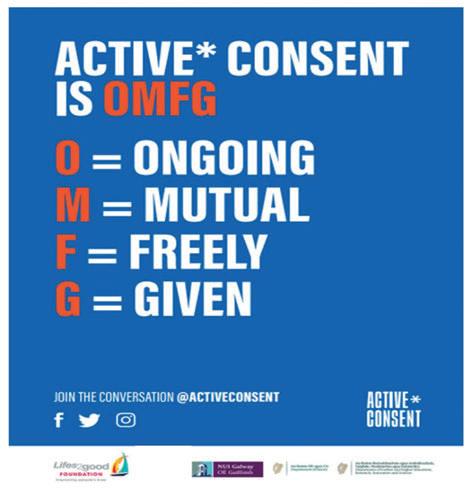
BCFE Students are encouraged to learn more about active consent by taking part in the following on-line training:
▶ eLearning Module - Over 17 - Active* Consent (consenthub.ie) https://www.consenthub.ie/explore/over-17s/elearningover17/
In a study carried out by NUIG, over 80% of young people say it is important to talk about sexual consent. Here in BCFE we support the Active Consent* programme.
The aim of the programme in BCFE is to both provide our students with the tools to recognise and communicate consent, but to also promote a positive and confident approach to their sexual health. It is a sex positive programme that also hopes to protect all parties involved while honouring their choices - whether or not they choose to become sexually active.

This means all parties can change their mind, that all parties consent and that neither party has been coerced or is under the influence.
Attached are some useful tools to help you navigate Active Consent.
Two particularly useful tools are “how do we communicate consent” and “No means No, but so does….” which will help you to communicate your willingness to take part or not to take part.
We also want our students to be aware that sharing intimate images of someone without their consent is illegal under the Harassment, Harmful Communications and Related Offences Act 2020.
Here in Ireland, we also have a consent law; Section 48.9.1, Criminal Law (Sexual Offences) Act 2017 which states that people must freely and voluntarily agree to engage in the sexual activity.
Stay safe and should you or someone you know need to contact SATU (Sexual Assault Treatment Unit) the details are below. Also be aware that guards will NOT be present at the initial meeting.
SATU Contact details
SATU (Sexual Assault Treatment Unit, Rotunda Hospital) 01 817 1736-Mon-Fri/01 8171700- out of hours satu@rotunda.ie
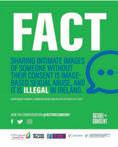
Your health, both physical and mental, influences how you think, feel and behave; it affects your capacity to learn, communicate and form relationships.
It is important to recognise that wellbeing impacts how you adapt to change and life events. Managing and maintaining you wellbeing will play a role in your learning journey as you progress through BCFE. Please refer to section on how to maintain positive wellbeing on the next page.
Mental health difficulties affect approximately 1 in 4 people and can adversely affect your ability to carry out day-to-day activities. In the current climate it is more important than ever to look after your mental health and wellbeing. Remember support is available within BCFE and through external bodies.
PLEASE REACH OUT TO YOUR COURSE COORDINATOR OR GUIDANCE COUNSELLOR IF YOU FEEL YOU WOULD BENEFIT FROM SPEAKING TO SOMEONE.
Jigsaw are offering you the opportunity to develop your knowledge, confidence, and skills in supporting a friend’s mental health and wellbeing This online course will take approximately 1.5 hours online and can be completed at your own pace. This course is designed to.
▶ Increase your feeling of confidence in initiating support for a friends mental health

▶ Develop your knowledge, understanding and skill sin order to best respond to and support a friends needs
▶ Increase your understand of boundaries and the important of looking after your own mental health while supporting a friend. Find this course at Jigsaw | One Good Friend (learnupon.com) https://jigsawportal.learnupon.com/store/3368448-one-good-friend
▶ Connect with friends, family, teachers and other supports.
▶ Create a routine and try to stick to it.
▶ Exercise regularly, especially walking.
▶ Attend college and go to classes.
▶ Create a study plan to help you stay on top of your college workload.
▶ Keep regular, healthy sleep routines.
▶ Maintain a healthy, balanced diet.
▶ Avoid excess alcohol and other substances.
▶ Practice breathing exercises, relaxation techniques.
▶ Find a hobby you enjoy such asreading a book, baking, cooking, painting, practicing yoga.
▶ Stay informed but set limits for social media.
▶ Be kind to yourself and others.
A list of helpful contacts, websites and apps that you can use on your mobile phone is available on the guidance counselling section of this Student Handbook and on www. bcfe.ie. • Please also see www.hse.ie/health and wellbeing.ie
IF YOU ARE USING MENTAL HEALTH SERVICES FOR AN EXISTING MENTAL HEALTH CONDITION, IT CAN BE HELPFUL TO HAVE A PLAN TO HELP YOU GET THROUGH DIFFICULT TIMES.
▶ Have a list of the numbers of mental health service and relatives or friends you can call if you need support.
▶ Keep taking any medication and continue to fill your prescription with support from your GP or medical professional.
The Counselling in Primary Care is a service for medical card holders, who are 18 years of age or over, and who want help with psychological problems that are appropriate for time limited counselling in primary care. It is for people with mild to moderate psychological difficulties and is accessed through your GP. It is a short-term counselling service that provides up to 8 counselling sessions with a professionally qualified and accredited Counsellor/Therapist. The service is
▶ Continue with any counselling or psychotherapy sessions.
▶ Ensure that you get your information from trusted sources.
▶ Practice relaxation techniques and breathing exercises.
▶ If your condition worsens see your Doctor or other health professional.
suitable for people who are experiencing certain difficulties such as:
▶ Depression
▶ Anxiety
▶ Panic reactions
▶ Relationship problems
▶ Loss issues
▶ Stress
If you find yourself in a crisis you can visit your local Accident and Emergency Department.
STUDENT SUPPORT OFFICER
IRISH SIGN LANGUAGE
INTERPRETER, NATIONAL LEARNING NETWORK

Location: Student Support Services Office Main Building 087 4067762 • aine.nally@nln.ie
My name is Aine, and I am the Student Support Officer (SSO) in BCFE, and I work on Thursdays in BCFE.
If you are commencing a course at BCFE and have a disability or a specific learning difficulty or another support need, you need to contact me, when you have been offered a place, so that I can meet you and organise the necessary supports for you to succeed and complete your course.
I will gather the relevant medical and psychological documentation from you to backup funding applications that I make on your behalf, for dedicated support. Any delay in engaging with me could affect the level of support that can be provided to you.
You can contact me by email: aine.nally@nln.ie, or by mobile phone/text - 087 4067762.
You can also make an appointment to meet me in my office (Main Building). I am in BCFE on Thursdays.
ASSISTANT PSYCHOLOGIST, NATIONAL LEARNING NETWORK

Location: Student Support Service Office Main Building 087 1342184 • chelsea.murphy@nln.ie
My name of Chelsea and I am an Assistant Psychologist working with the National Learning Network and I work in BCFE on Wednesdays and Fridays.
I work closely with the Student Support Officer (SSO) to provide students with social, organizational and well-being support that is needed to help students succeed and complete their course. Where required I will assist with the academic support team within BCFE, and I also provide group support sessions in study skills, social skills and workload management.
The SSO will refer students directly to me for support. You can also contact me by email: chelsea.murphy@nln.ie, or by mobile phone/text –087 1342184.
A wide variety of students who live with a variety of disabilities are supported through our service every year at BCFE. Examples include:
▶ Autistic Spectrum Disorder
▶ Deaf/Hard of Hearing (HOH)
▶ Developmental Coordination Disorder, Dyspraxia
▶ Mental Health Difficulty
▶ Ongoing Illness, health condition e.g. Cystic Fibrosis, Diabetes
▶ Physical Disability
▶ Specific Learning Difficulty, Dyslexia
▶ Speech and Language Difficulty
▶ Visual Impairment
Prior to registering for this service, you need to visit BCFE’s website and read the information in relation to the Student Support Service under MyBCFE. This information will provide you with clarity around what the service is and what supports are available. The two documents to read are:
▶ Handbook for Students Availing of Support Transitioning from School to College
▶ Information for Students with Disabilities, Health Conditions and or Specific Learning Difficulties
You then need to complete the Needs Assessment Form which gives you an
opportunity to provide information describing the impact of your disability in the learning environment. You can outline the supports you received at school, for example learning supports and exam accommodations. This Needs Assessment Form will also ask you to consider the supports that you will required to complete your course in BCFE. When you have completed the from, please email it to me, with medial evidence confirming your disability/ difficulty. Please note, a letter from your GP is not sufficient, documentation is required from a specialist/consultant.
As SSO, I am a link and advocate for BCFE students with disabilities and additional support needs. I have a key understanding of disability challenges in Further Education and I appreciate the individuality of students with disabilities and the diversity of needs which students may have in the learning environment.
One of my key roles is to apply, on behalf of students, to the Fund for Students with Disabilities (FSD). Within the limits
If you have been granted reasonable accommodations for your Junior/Leaving Cert, and you can provide me with documentary evidence of this, you can avail of the same accommodations for
of available resources, and subject to funding approval, the following are the types of supports available to students who fulfil criteria for FSD:
▶ Irish Sign Language Interpreter
▶ Notetaker
▶ Personal Assistance, with academic support
▶ Funding towards taxi costs
▶ Assistive Technology and Software
▶ Academic Support
end of year exams at BCFE. Examples of reasonable accommodations include a reader, scribe, extra time, spelling and grammar waiver, rest breaks etc.
*REMEMBER: The Student Support Service acknowledges that BCFE students are adults and encourages you to take charge of your learning and educational progression. We encourage you to access the supports you have requested and to inform us if your requirements change during the academic year.

EMAIL: jason.king@bcfe.cdetb.ie
Location: Main Building Room 16A
In BCFE we are committed to promoting equality of access for all students. Academic support ensures that students who are experiencing difficulties with their learning have their educational needs met and are fully included in the student experience at BCFE.
My role in BCFE is to provide academic support to students:
▶ who may be struggling with their course work and assignments.
▶ who may be experiencing anxiety or mental health difficulties.
▶ who may be finding returning to education challenging.
▶ whose first language is not English.
▶ who may have literacy needs.
▶ or may have specific learning difficulties such as dyslexia and ASD.
Academic support involves classes, small group sessions and one to one support. It covers such areas as research techniques, critical thinking skills, academic writing, organisational and study skills, Harvard referencing, literacy and overall literacy skills.
Academic Support can also provide students with the IT skills needed for college, including: navigating and managing BCFE’s IT and online learning systems, Internet research skills and general computer literacy needs. Academic and IT support materials are available on Moodle by selecting Students Support Services in the course category and then selecting Academic Support. The login is ‘guest’ and the password is ‘support’.
▶ Facilitates all students to participate fully in the curriculum and achieve their academic potential at BCFE.
▶ Supports any student who is experiencing difficulties so, “no student is left behind” and to help develop increased self-esteem and positive attitudes for all students to the learning environment in BCFE.
▶ Encourages students to investigate and identify their individual learning styles and the type of learning that suits them best.
▶ Helps students to take ownership and responsibility for their own learning, as this is an important step in becoming an independent learner.
“I studied Journalism and Media Production Management at BCFE for three years. During that time, I noticed I was struggling with structure when writing assignments (…) knowing I could turn to Academic Support helped me to not fall behind or possibly give up. I have now finished BCFE with a degree(…) So please engage with Academic Support when you feel your work is getting on top of you, you may only need to learn to calm down and understand structure. Enjoy your learning at BCFE, they are all there to help you!”
Anne Buckley (Graduate of HND in Journalism and BA Honours Degree in Media Production Management)

EMAIL: anna.gacquin@bcfe.cdetb.ie
Location: Main Building Room 23A
Dr Margaret Mac Curtain, founding Principal of this college, was also a renowned social justice activist and educator. As a social reformer, she sought ‘social justice through education’ to improve lives and reduce inequalities by giving a diverse range of learners more fair and accessible educational opportunities, her legacy is what further education is known for today.
▶ I have specialist training in diversity, equality, inclusion, and social justice to support you as your contact in the college.
▶ I support all students in understanding how diversity and social justice issues can affect college experience and life experience.
▶ I work alongside Class Reps. and the Students Union Council in identifying students’ diversity and social justice needs and in addressing those needs.
▶ I work in partnership with all staff to understand and tackle inequalities that cause barriers for learners, in our courses, in our extra-curricular activities, and/or in the college environment.
▶ Organising BCFE participation in the Saolta Global Compass/FET challenge this year.
▶ become a ‘Student Champion’.
▶ join a college Social Action Project.
▶ come to any monthly workshop on Social Justice.
At the weekly ‘open door’, posted on college media. Everyone Welcome!
(the closer you are to the centre, the more privilege you have)
Note:
The Department of Further and Higher Education, Research, Innovation and Science provides a meanstested maintenance grant scheme for those attending full-time further education. All applications for grants are made online through Student Universal Support Ireland, known as SUSI, at www.susi.ie.
▶ BCFE is an approved college for maintenance grants only. This means that all fees must be paid by students on SUSI grants.
▶ Currently, all our QQI Level 5 & 6 courses as well as our HNDs are approved courses.
▶ Please note, maintenance grants are not paid for top-up degree courses in BCFE i.e. Visual Media BA Hons (Animation and Games) Degree Level 8 and Media Production Management BA (Hons) Degree Level 8.
▶ The maintenance grant is paid directly into the students’ bank account each month (over a 9-month period) and is available to fully registered PLC students who are progressing from one level to the next.
▶ The SUSI grant is only available to PLC students for three years.
▶ There is a list of payment dates on the SUSI website.
▶ The SUZI grant is paid a month in arrears. This means, for example, that your will be paid in November for October ’s grant and that payment will be based on your attendance in October.
▶ Students on the BA (Hons) Immersive Media Production degree with IADT can apply for the full SUSI grant, i.e. maintenance and fees.
▶ BCFE is required to return students attendance monthly to SUSI for grant payments, those not attending will have their grant suspended.
The VTOS scheme has ceased for new entrants from 2024.
Returning VTOS students need to apply directly to info@bcfe.cdetb.ie
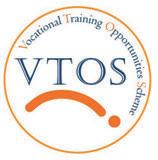
This scheme is run by the Department of Employment and Social Protection (DEASP) and allows people in receipt of certain social welfare payments to retain those payments whilst participating in fulltime further education courses. Refer to www.welfare.ie or email info@bcfe.cdetb.ie for further information.

Students who are experiencing extreme financial difficulty can apply for supports through the BCFE Student Support Fund.
1 The student applies in writing using Student Support Fund application form which is available from the Administration Office.
2 The student has furnished a brief account which clearly explains their need for this support so that the committee can determine (in a fair and equal manner to all applicants) the granting of the fund.
3 The coordinator of the course in question has signed the application form.
4 The student has completed, signed, and submitted all BCFE registration forms, is fully registered and all applicable fees have been paid.
5 The student has satisfactory attendance on their course.
6 The student is not in receipt of SUSI grant, VTOS, BTEI, or BTEA.
7 The student does not have a part-time or a full-time job.
8 The student is not partaking in Erasmus+ work placements.
Throughout your studies, you will submit assignments on different dates during the year. Depending on the course of study these assignments may be practical in nature, or they may be presented in the form of written work. Your subject teacher will provide you with the assessment information for your subject. Here are some tips to guide you when presenting your work for grading.
Important: Unless requested otherwise, written work should be submitted as a Word document only, so that it can be checked for plagiarism using plagiarism detection software such as ‘Turnitin’.
When working on an assignment you will be given a brief. The assignment brief outlines what is required of you for that particular assignment. Treat your assignment brief as a long ‘to do’ list. Break it down into tasks and tackle each one at a time.
Depending on the course of study, assignment briefs may include a marking scheme which outlines what you need in order to meet your learning outcomes and achieve a good grade, double and triple check these requirements to ensure you have not missed or forgotten an element.
Important: When you are presented with an assignment brief take some time to read and digest it. If you do not understand what is being asked of you, it is up to you to ask your subject teacher to explain it further. Always question, we are here to support you on your learning journey in BCFE.
When presenting work ALWAYS name your files. Your file name should consist of the following parts:
1. Student Full Name
2. Course Code
3. Module Name
4. Assignment Title
Here is an example of the order your file name should follow.
John_Smith_ELT_Communications:_Structured_Report
It is very important that you regularly backup of all your digital work. A backup is a copy of important data that is stored on an alternative location, so it can be recovered if deleted or it becomes corrupted. You need to back up your data as hard drives crash, files can accidentally be deleted or become corrupt, viruses can corrupt or delete files, you may need to upgrade to a new computer and need to move your files and most importantly your module teacher may request an additional copy. You can create a backup of your data by coping your files to an alternative data source such as a cloud-based account like OneDrive which forms part of Office 365.
Most importantly you need to retain a full separate digital copy of all your final assessment work in case an additional copy is required.
Depending on the module you may be asked to use a BCFE cover page. Regardless of what the cover page looks like you must have the following details on the front page of any assignment submission.
▶ Your name
▶ Name of module
▶ Name of module teacher name (the teacher the assignment is being submitted to) Assignment title
▶ Assignment due date and submission date
Here is a recommended format for submitting written work.
Header: Name: Class:
Date: Font Size Headings: 16
Sub-Headings: 14 Text: 12
Font Style: Arial Spacing: 1.5
Margins: Justified Pages Numbered: After the Introduction Sections and Subsections: numbered


Being able to make good notes efficiently is a key skill for studying at BCFE.
▶ You will need to make notes in different situations: in lectures, seminars and tutorials; when working in groups; when planning and writing essays; on field trips and placements and when revising for exams.
▶ You should take note of important information for use in your academic studies including essay writing and revision.
Note taking can help you:
▶ Keep a record of your learning and where you obtained your information from, as this will help when it comes time to write your bibliography.
▶ Plan and organise essays, assignments and presentations.
▶ Focus on a specific subject and remember key facts.
▶ Revise effectively for your exams.
▶ Create a study timetable for yourself to include your class schedule and any parttime work you may be doing. This will help you tackle your course work in a manageable way.
▶ Remember to take regular breaks, get up from the desk, stretch your legs, and most importantly get some fresh air.
▶ Create or choose an environment which suits your learning needs.
▶ Limit noise and distractions.
▶ Ensure you are comfortable that the room temperature is not too hot or too cold and that you are in a supportive chair.
▶ Good lighting is key
▶ Break large tasks into smaller more manageable chunks. Treating your assignment brief like a to do list can make the tasks less daunting.
▶ Maintain a healthy balanced diet and drink plenty of water. It’s next to impossible to focus with a dehydrated or hungry body.
▶ Use technology to help you: From meditation apps to dictation tools like Otter, use freely accessible technology to make your life easier.
BCFE uses the Harvard Style of Citing and Referencing as standard on all courses.
The Harvard referencing style enables you to:
▶ to show the depth and scope of the research you have undertaken
▶ to acknowledge others’ ideas and research (thereby avoiding plagiarism and comply with copyright laws)
▶ to provide readers with quick access to the source material you reference
As part of your coursework, you will be asked to produce reports, essays and other written texts, and you will need to back up your writing with reference to supporting evidence published in books, newspaper articles, films, documentaries, journal articles, web pages and web sites, etc.
It is important to record the details of all the sources of information that you use to produce these written assignments. This record will help you when referencing sources in your written work.
You must reference sources twice in your written work:
▶ In-text Citation
When the source is first referred to within your text Format: (Surname, Year, Page Number)
▶ Reference list
When you compile a list of referenced sources at the end of your text
You will need to cite the sources for every quotation, statistic, opinion, concept or specific idea that you use.
Short quotations of no more than three lines or 20-25 words, may be incorporated into your texts and enclosed by quotation marks.
Example:
According to Bryman (2012, p.120), “referencing the work of others is an important academic convention because it emphasises that you are aware of the historical development of your subject.”
Longer quotations should be entered without quotation marks, as a separate paragraph, indented on both sides with single line spacing.
Example:
Exploring different ways stereotypes have been employed in media discourse, O’Sullivan et al. argue that:
In media studies the term stereotype has had many different applications including as: a label which involves a process of categorisation and evaluation. Although it may refer to situations or places, it is most often used in conjunction with representations of social groups. In its simplest terms, an easily grasped characteristic (usually negative) is presumed to belong to a whole group, e.g. estate agents are insincere, devious and smooth talking. In ideological terms, stereotyping is a means by which support is provided for one group’s differential (often discriminatory) treatment of another. (O’Sullivan et al, 2003, p.78)
At the end of your assignment, you must include a detailed list of all the in-text citations. This reference list should be organised alphabetically according to the authors’ or editors’ surnames and adhering to the following formats:
(A) To Reference a Book :
Format:
Author(s) surname(s) and first initial(s) Date of publication in brackets Title italicized +full stop
Example:
Edition (if not the first) +full stop
Place of publication +colon
Publisher’s name +full stop
O’Sullivan, T., Dutton, B., Rayner, P., (2003) Studying the Media. London: Hodder Arnold.
(B) To Reference a Website:
Format:
Website author(s) Year published/Last updatedTitle of the internet site italicizedURLDate of access in brackets
Example:
Ballyfermot College of Further Education (2024) Ballyfermot College of Further Education Available at: http://www.bcfe.ie (accessed 1 February 2024)
(C) To Reference an Online Newspaper Article
Format:
Author(s) surname(s) and first initial(s)
Example:
Year of publication in brackets
‘Article Title’ +comma Title of publication in italics+ comma
Date of publication, Day/ month +full stop
Available at: URL + full stop Date of access in brackets + full stop
Hoare, P (2021) ‘Such a chore: men and women differ widely over who does bulk of work’, The Irish Examiner, 22 June. Available at: https://www.irishexaminer.com/news/ arid-40319624.html. (Accessed: 22 June 2021).
(D) To Reference a Talk on YouTube
Speaker’s surname, and first initials. Year of posting in brackets ‘Title’ of talk in italics
Example:
Available at:URL [Date of access]
Cuddy, A. (2012) ‘Your body language may shape who you are | Amy Cuddy | TED’ Available at: https://www.youtube.com/watch?v=Ks-_Mh1QhMc (Accessed: 22 June 2022).
DATA PROCESSING POLICY

CODE OF CONDUCT
ATTENDANCE, RETENTION AND FITNESS TO PRACTICE POLICY
COMPLAINT
PROCEDURE: STAFF AND STUDENT
ADMINISTRATION OF MEDICATION
COMPUTER USAGE
ASSESSMENT MALPRACTICE
GENDER IDENTITY AND EXPRESSION
OUT OF COLLEGES ACTIVITIES
ADMISSIONS
COMPLAINT
PROCEDURE: STUDENT AND STUDENT
ACCESS TO EDUCATION FOR ALL
CCTV
DATA PROTECTION
CHILDSAFEGUARDINGPROTECTION STATEMENT AND PROCEDURES
DIGNITY AND RESPECT POLICY
CRITICAL INCIDENT
NO SMOKING OR VAPING
Every stage of your BCFE journey is guided by policies and procedures. These policies serve to protect you and inform you of your rights and responsibilities. You should broadly familiarise yourself with these documents. Those most relevant to you are summarised in alphabetical order here.

A full copy of each policy and procedure is now available for you on MyCampus. Please note that other policies and procedures may be developed during your college year and BCFE will notify you about any newly developed or amended policies and procedures when necessary.
Access to Education for All: This policy aims to underpin BCFE’s commitment to a learning environment in which all BCFE’s students have equal opportunity to take full advantage of pursuing their further education while accessing courses in the college. BCFE is committed to providing additional and reasonable accommodations that will help to remove potential barriers that could prevent some students from equitable participation in their studies while in BCFE. The college strives to ensure no student is disadvantaged over another while pursuing their studies in BCFE and that their achievement can be compared fairly to the achievement of their peers. BCFE offers equity of access to its courses regardless of gender, civil status, family status, sexual orientation, religious
belief, age, disability, learning difficulty, race, ethnicity, or socio-economic background. BCFE is committed to ensuring that equity, diversity, respect, and inclusion are firmly at the forefront of access to education for all in BCFE.
Administration of Medication: This policy has been prepared with reference to best practice in managing chronic health conditions as prepared by the Asthma Society of Ireland, Diabetes Federation of Ireland, Brainwave the Irish Epilepsy Association and Anaphylaxis Ireland. This policy aims to meet the needs of students, who require administration of essential medications during the college day, in compliance with legislation and in line with best practice. This policy also seeks to protect BCFE representatives by ensuring that any involvement in medication administration complies with legislation and best practice guidelines.
Admissions: This policy clarifies the procedure involved in applying to undertake a course in BCFE and the steps that must be taken before you become a fully registered student. It also outlines the application procedure you must follow to defer, delay course completion, repeat or apply to complete the second year of your course. You also refer to the Course Completion section of this handbook.
Assessment Malpractice: This policy sets out clear definitions of both academic integrity and plagiarism and outlines how you can ensure that the evidence you submit for assessment meets the
standard. Academic integrity is ‘the expectation that teachers, students, researchers, and all members of the academic community act with honesty, trust, fairness, respect, and responsibility. Academic integrity is a fundamental principle that should underpin all academic activity in BCFE. Breaching academic integrity is known as ‘academic misconduct’. Plagiarism is an example of ‘academic misconduct’ and this means using the work of others without acknowledging the original source.
Practice Policy: As a registered fulltime student, you must participate fully on your course. Full attendance is desirable for your sequential learning and award success whether you are in-class or online. Each class builds on the knowledge, skills, and competencies of the previous class. Vital information about subject assessment, course and college activities are delivered in class and unless you attend you will miss this information. Your course in BCFE will train you for the workplace, and in the workplace, absenteeism will not be tolerated.
Students undertaking a programme in BCFE must have the skills, knowledge, health and character necessary to undertake and complete a programme effectively. This is defined as a students’ fitness to practice as part of a programme. These requirements are especially important in programmes that involve contact with the general public, patients, children and vulnerable adults.
BCFE is aware that students can face considerable challenges when they commence a course of study. The aim of this policy is to encourage and support students to complete their course. This includes providing course induction, supports (where applicable) and providing options to assist students in completing their award. Students will be asked to complete the Student Participation form. This form identifies how you can successfully participate in your course of study in BCFE to achieve your full award. This form brings together all aspect of college life and clearly lays out the standards expected of you during your time in BCFE.
BCFE monitors subject and daily attendance. Students who are not attending specific subjects could run the risk of not having assessments accepted and students who are not attending the daily timetable will be deemed to have opted out of the course. In general, a minimum of 75% attendance is required in all subjects.
It is a legal requirement that BCFE monitors and records your attendance. BCFE uses a software programme called VSware to do so. Every teacher is required to complete attendance at each class. BCFE is then obliged to report this attendance to SUSI, the Department of Employment and Social Protection (DEASP) or SOLAS for Traineeship allowances upon request. Poor attendance will therefore affect your grant, DEASP allowance or Traineeship allowance.
Those students who provide a medical certificate will be marked accordingly on VSware, however those students who are on long term sick leave will have their position on the course reviewed after 1 month and could be asked to withdraw for academic reasons.
CCTV: BCFE, as a constituent college of City of Dublin ETB, is bound by its CCTV Policy. This policy supplements the CCTV privacy notice in BCFE and the City of Dublin ETB Data Protection Policy. All of these are available at www.cdetb. ie/policiesandprocedures. This policy outlines the reasons why CCTV is used and what CCTV data is collected.
Child Protection Safeguarding Statement and Procedures: Recognising that there are some students under the age of 18 attending BCFE, and that child protection and welfare considerations permeate all aspects of college life; BCFE policies, procedures, practices and activities will adhere fully to the principles and requirements of the Children First Act 2015, Children First: National Guidance for the Protection and Welfare of Children 2017, the Child Protection Procedures for Primary and Post Primary Schools 2017 and Tusla Guidance on the preparation of Child Safeguarding Statements.
Code of Conduct: The Code of Conduct sets out the standards of behaviour that BCFE expects of you. You should familiarise yourself with these expectations as understanding your responsibilities will help you to make the most of your experience and gives you the opportunity to contribute to a positive learning environment for others while you are a student in BCFE. The primary aim of this Code of Conduct is to create an inclusive learning environment. BCFE upholds to administer this Code of Conduct fairly and consistently and is required to record all incidents on individual student profiles where necessary. All students are given every opportunity to engage with students supports (internal
and external referral) throughout the entire process.
Complaint Procedure: Staff and Student: A procedure for processing complaints made by parents/guardians of students OR adult student(s) currently enrolled in a City of Dublin ETB school/centre against a staff member employed by City of Dublin ETB is available at www. cdetb.ie/policiesandprocedures This procedure outlines the informal and formal approaches to resolution that must be undertaken.
Complaint Procedure: Student and Student: This policy is to provide a system which allows students participating in BCFE courses to make complaints in respect of students who are also attending BCFE. The purpose of this policy is to establish a protocol for dealing with complaints. It is BCFE’s policy to keep a record of all complaints received for a fixed period, in accordance with City of Dublin Record Retention Schedule, and to endeavour to respond to complaints as quickly as possible. This procedure applies to all students in BCFE.
Computer Usage: City of Dublin ETB has developed a clear and comprehensive policy in relation to ICT usage. This policy governs staff and students and is available at www.cdetb.ie/ policiesandprocedures. As a student in BCFE you will (a) receive a @bcfe.ie email address, (B) have access to ICT equipment, and (C) you may have a device on loan such as a laptop. This policy governs use of that equipment and ICT access and especially refers to email, the internet, use of social media, software, mobile devices and displaying material of an obscene or offensive nature.
Critical Incident: This policy aims to protect and provide support to the entire community in the event of a Critical Incident. Most incidents are managed on a day-to-day basis with a natural informed response. However, situations may arise of an overwhelming nature which require an exceptional, planned and coordinated response. Therefore, a Critical Incident is defined as any incident or sequence of events that overwhelms the normal coping mechanism of the college. Within BCFE there is a Critical Incident Management Plan and a Critical Incident Team in place to respond to and support the entire college community.
Data Processing Policy: This City of Dublin ETB policy clearly sets out BCFE’s approach to Data Protection, Data Processing and GDPR. This policy can be viewed at www. cdetb. ie/policiesandprocedures. This policy outlines BCFE’s responsibilities regarding the capture, retention and sharing of your data.
Data Protection: City of Dublin ETB is committed to a policy of protecting the rights and freedoms of individuals with respect to the processing of their personal data. This Data Protection Policy applies to the keeping and processing of Personal Data and Sensitive Personal Data, both in manual and electronic form, held in relation to BCFE staff and students. This policy applies to all BCFE staff, the Board of Management, parents/guardians, students and others (including prospective or potential students and their parents/guardians, and applicants for staff positions within BCFE) in so far as the measures under the policy relate to them. Data will be stored securely, so that confidential
information is protected in compliance with relevant legislation.
Dignity and Respect Policy: BCFE is committed to promoting dignity and respect and facilitating the right of you and every other member of BCFE’s community to study and work in an environment, real or online, which is free from bullying, harassment, or discrimination.
This policy aims to:
• Clearly establish that BCFE does not tolerate any form of bullying, harassment, or discrimination.
• Raise awareness of the prevention of bullying, harassment, or discrimination.
• Empower you as a student to ensure that your rights are respected and to also have responsibility for your own actions, ensuring they do not infringe others’ rights
• Clearly outline the steps you must take if you feel that you are being bullied, harassed, intimidated, or discriminated against. These steps include informal and formal approaches to resolution and will uphold the rights of both the complainant and the person against whom the allegation is made.
• Use existing policies and procedures, wherever appropriate to ensure that problems can be addressed effectively and quickly.
Gender Identity and Expression: BCFE is committed to providing a welcoming, gender-inclusive working and learning environment where every member of the campus community will be treated with respect and dignity irrespective of their gender identity, gender expression and sex characteristics.
To change a recorded name and/or gender:
As you know, students must provide proof of identity at registration and this is then matched to official SOLAS, DEASP and DFHERIS records. If you wish to change your gender and/or your name/email address on official BCFE’s systems and Certification the following documents are needed.
• Gender Marker, check your document Certificate for Gender Change
• Deed Pole for Name change
You will also need to alert your Course Co-ordinator to your preferred name. This will be recorded on BCFE’s Student Management Database Systems (VSware) beside your birth name. This is so that BCFE staff can respect your preferred name.
Out of College Activities Policy: BCFE provides students with opportunities to participate and engage in a range of Out of College Activities (OCAs) such as social, sporting, educational, training, and cultural activities. OCA’s provide significant learning opportunities to complement the classroom learning experience. This policy governs all aspects of OCAs.
Smoking or tobacco products and use of electronic cigarettes: BCFE’s campus is designated as a no smoking and no vaping campus. This means that you cannot smoke tobacco products or
electronic cigarettes in any of the three buildings, in the front of the buildings, in the car park or in the environs of either building. As you know the smoking of tobacco products on BCFE premises is prohibited under the Tabacco Smoking (Prohibition) Regulations 2003. This was extended in 2023, by City of Dublin ETB, to prohibit the use of e-cigarettes and all other electronic smoking and vaping products on BCFE’s campus. The college, in line with the 2003 Regulations, has designed places for staff and students to smoke and vape.
Student Retention Policy: BCFE is aware that students can face considerable challenges when they commence a course of study. The aim of the Student Retention policy is to encourage and support students to complete their course. This includes providing course induction, supports (where applicable) and providing options to assist students in completing their award.
Student Participation Policy: You will be asked to complete the Student Participation policy form. This form identifi es how you can successfully participate in your course of study in BCFE to achieve your full award. This form brings together all aspect of college life and clearly lays out the standards expected of you during your time in BCFE.
The aim of this Acceptable Use Policy (AUP) is to ensure that students will benefit from learning opportunities offered by BCFE’s ICT resources in a safe and effective manner. Any student who uses BCFE’s computer and network facilities does so on the understanding that he/she agrees to abide by the City of Dublin Educational Training Board Committee’s (CDETB) Computer and Network Usage Policy and by the Code of Practice outlined below. The primary purpose of this Code of Practice is to ensure that all users operate in a safe and secure environment and that the computer and network resources in the BCFE are protected from loss, modification or destruction. Therefore, if the BCFE’s AUP is not adhered to appropriate sanctions as outlined in the Code of Practice below may be imposed.
BCFE will provide links to the following legislation on our website (bcfe.ie) which underpins the usage of the computer and network facilities which students should familiarise themselves with:
▶ The Data Protection Act 1988
▶ Data Protection (Amendment) Act 2003
▶ Child Trafficking and Pornography Act 1998
▶ General Data Protection Regulation - Regulation (EU) 2016/679
1. To accept that any behaviour considered inappropriate in the ordinary world is also considered inappropriate in the virtual world and that inappropriate behaviour in using the Internet is prohibited.
2. To make no attempt to try to gain access to confidential information concerning individuals which is held on the system, “hack” into systems or interfere with the intended operation of the BCFE’s computer and network resources and to accept that “hacking” is a serious offence under criminal law.
3. Not to access, download, save, create or transmit unauthorised software, copyrighted files (i.e., BitTorrent), “plug-ins”, games or other entertainment software (including screen savers) or save inappropriate or offensive material.
4. To not knowingly perform any act which will interfere with the normal operation of computers, peripherals or networks or knowingly destroy the integrity of computer-based information.
5. Not to give another individual unauthorised access to my computer account and to make no attempt to access another individual’s computer files.
6. Not to use the computer and network facilities for unauthorised profit or commercial purposes.
7. Not to create or transmit any abusive, obscene, threatening, defamatory, offensive or harassing images or material or cause offence to another individual or discriminate on the grounds of gender, marital status, sexual orientation, religious or political belief, age,
disability, race, colour or membership of the traveller community.
8. To use social media in a responsible manner and not to engage in behaviour on social media which would impact the college or other students in the college.
9. Not to send or store anonymous email or partake in or promote chain email messages or send unnecessary files that would adversely affect computer and network resources.
10. Not to open email attachments from unsolicited or unknown sources.
11. That by its very nature, the Internet is an insecure network with no guarantee of either privacy or confidentiality for its users and that information posted on the Internet is available to a global audience.
12. Not to register or sign “visitor’s books” on Websites without prior permission.
13. That BCFE may check my computer files and monitor my email and Internet activities.
14. To report to BCFE any suspected abuse of computer and network resources, or any inappropriate material or email that may come to my attention as well as any suspected damage or problems with files.
15. That should I fail to comply with any of the preceding conditions, all access privileges may be denied to me and I may be subject to other disciplinary procedures.
▶ Misuse of network resources and abuse or infringement on the conditions outlined in this ‘Acceptable Use Policy’ will result in referral to the processes and possible sanctions within the BCFE Code of Conduct and may result in withdrawal of access privileges.
▶ BCFE reserves the right to report any illegal activities to the appropriate authorities including TUSLA and/or the Gardaí. This could include unacceptable use of the internet, inappropriate use of any app which includes the camera, inappropriate, inaccurate, defamatory, obscene or illegal material found on devices. This also includes the distribution, publication and sharing of any inappropriate images and/or links to private and confidential data.
It is envisaged that BCFE will revise this AUP annually. Before signing, the AUP, it should be read carefully to ensure that the conditions of use are accepted and understood. I have read and understood the above and agree to its terms.
Signed:
Course:
Name: (BLOCK LETTERS)
Date:
As a fulltime student in BCFE I commit to the following:
1. I understand that it is my responsibility to acquaint myself with all the details of my course, assessment procedures, BCFE rules and regulations as outlined in BCFE’s Student Handbook 2024/2025.
2. I am fully committed to the course which I am undertaking. I will work to the best of my ability and will meet all deadlines set.
3. I understand that I will only become a registered student once I have supplied all necessary documentation and paid any relevant fees.
4. I understand that I need to pass all modules to gain my full award. In addition, I understand that it is my responsibility to research the progression opportunities available, so that I am aware of the grades and components required to secure a place on a Level 6 course within BCFE or a Third Level place.
5. I realise that my performance (attendance, work input, behaviour, and general attitude) at BCFE will be reflected in any reference given by BCFE. In addition, this performance will be considered should I apply to repeat a year of a course or apply for another course in BCFE the following year.
6. BCFE requires students to attend all modules on offer, fully and punctually. I understand that if I am unable to fulfil this commitment that I may be asked to withdraw from my course of study. I understand that it is my responsibility to notify my course coordinator of any attendance difficulties I have. Absences with medical certification fall outside normal attendance requirements.
7. I understand that I have an obligation to meet any Safety, Health and Welfare Rules and Regulations as they relate to my course, myself and others. This includes respecting that BCFE is a smoke, vape and intoxicant free zone.
8. I am aware that there are CCTV cameras on the BCFE campus and that the recordings from these cameras can be used in the event of an accident or incident.
9. If I am absent from BCFE, I accept that it is my responsibility to acquaint myself with any assessment or examination details, timetable changes announced or displayed during my absence.
10. I understand that BCFE will communicate general messages and notifications either through text or through my BCFE email and that it’s my responsibility to notify BCFE of any changes to my personal data including telephone number or postal address.
11. I understand that I must notify my course coordinator if I have any additional learning needs or need for examination accommodations on or before Friday, 11th of October 2024
12. I commit to submitting assignment work that is (a) my own, (b) properly referenced, (c) not copied from another student, (d) not copied from the Internet, book, website, journal or manual or not (e) AI generated. I also commit to keeping a backup electronic copy of all my assessments.
13. I commit to abiding by the BCFE Student Code of Conduct. PLEASE COMPLETE THIS FORM USING BLOCK CAPITALS
During your time as a student of BCFE you or your coursework may appear in films, videos, sound recordings and photographs through daily interaction with BCFE life and participation in BCFE events.
With your consent these files, videos, sound recordings, photographs and coursework may be used to promote BCFE and may be reproduced within the media industry for marketing, advertising and information purposes. This includes publications such as brochures, flyers, newsletters and newspaper articles and on social media platforms including Facebook, Instagram, Twitter etc.
In addition, these media files may be used/ shared by the Department of Further and Higher Education, Research Innovation and
Science (DFHERIS), SOLAS, City of Dublin Education and Training Board (CDETB) or an advertising agency to promote, brand and market BCFE.
I consent to the use of any media material that I or my work appears in for the purposes outlined above. I also consent that this material may be reproduced and adapted for projects that relate to the branding and marketing of BCFE and this may include quotes and verbatim comments all of which will be attributed as my work.
I understand that I do not own the copyright over any such material stored on any medium, of film(s) produced, of images and photograph(s) taken, of sound recordings made and of coursework produced.
* I am over 18 years of age - yes/no (if not please ask your parent or guardian to countersign the form)
Name:
Course:
Date:
I hereby confirm that the information provided herein is accurate, correct and complete and I consent to the processing of my personal and special category data by BCFE and CDETB.
THIS FORM MUST BE COMPLETED WHERE THE STUDENT IS UNDER 18 ON DATE OF REGISTRATION
COLLEGE: Ballyfermot College of Further Education
STUDENT NAME:
DATE OF BIRTH:
COURSE:
DURATION: 16th September 2024 until the 30th May 2025
I give permission for the above named student to attend all educational trips, work experience, location work and life drawing classes. Life drawing classes require students to develop their technical skills drawing life models who may be nude.
SIGNED:
DATE: (Parent or Guardian)
Print Name (Parent or Guardian):
Parental/Guardian Contact Telephone No:

To create a caring and supportive learning environment through the provision of excellent teaching and guidance.
BCFE is committed to:
▷ Providing educational opportunity and support to all, and in particular to our local community
▷ Being innovative and creative in the provision of courses to meet the needs of our present and prospective students
▷ Encouraging active citizenship and creating a culture of critical engagement with global social justice issues
Follow, Like & Share
▷ Encouraging graduates to meaningfully contribute to their community, both local and global
▷ Providing students with the relevant qualifications and competencies to succeed in work and in further studies
Contact details:
Ballyfermot College of Further Education, Ballyfermot Road, Ballyfermot, Dublin 10, D10 TX46
Phone: +353 1 629 8500
Email: info@bcfe.cdetb.ie
Website: www.bcfe.ie
Disclaimer
BCFE is a constituent college of the City of Dublin ETB. The City of Dublin ETB is the patron of the College, as laid down in the Education and Training Boards Act 2013.
Chief Executive: Dr Christy Duffy
City of Dublin ETB Board: www.cdetb.ie
The information contained in this Handbook is up-to-date at the time of publication. Students are advised to check all awards and progression links on a regular basis with the relevant institution.
Acknowledgements
Artwork and photography featured in this Handbook were created by students and staff of BCFE.

